Author: Bao Ngan Nguyen
Indefinite pronoun คืออะไรถือเป็นหัวข้อไวยากรณ์ที่ซับซ้อนมากสำหรับทุกคนทั้งในระหว่างการเตรียมสอบและเมื่อลงสนามสอบจริง งั้นต้องทำอย่างไรเพื่อให้เข้าใจ Indefinite pronoun ได้? เรามาเรียนรู้ indefinite pronoun สรุป สั้นๆ พร้อมกับ ELSA Speak กันเลย
Indefinite pronoun คืออะไร?
Indefinite Pronouns คือ คำสรรพนามที่ไม่ชี้เฉพาะเจาะจงและจะถูกนำมาใช้เมื่อต้องการกล่าวถึงคน สถานที่ หรือสิ่งของอย่างไม่เจาะจง Indefinite pronoun มีคำนำหน้า อย่างเช่น no-, every-, any- และ some- และใช้เพื่ออ้างถึงบุคคล สถานที่ หรือสิ่งของโดยไม่ต้องระบุสิ่งเหล่านั้น มักใช้เมื่ออธิบายถึงปริมาณที่ไม่แน่นอนหรือไม่อยากระบุไว้อย่างชัดเจน
ตัวอย่าง มีบางคำเช่น some any (บางส่วน – ไดๆ), every (แต่ละ) และ no (ไม่มี) มักใช้เพื่ออธิบายสิ่งต่าง ๆ ที่ไม่ชัดเจนหรือไม่เฉพาะเจาะจง
ตัวอย่างคำสรรพนามที่ไม่ชี้เฉพาะเจาะจง: all, any, another, anybody/anyone, anything, everybody/everyone, each, everything, few, nobody, many, none, several, one, some, somebody/someone.
Indefinite pronoun ตัวอย่างประโยค :
- Each of the players on the football team has a doctor
(ผู้เล่นทุกคนในทีมฟุตบอลมักจะมีแพทย์ด้วย).
- I met two boys. One has given me his phone number
(ฉันได้พบกับผู้ชายสองคน หนึ่งในนั้นให้เบอร์โทรศัพท์ฉันมา)
Indefinite pronoun มีไว้เพื่ออะไร?

เราสามารถใช้สรรพนามไม่ชี้เฉพาะเจาะจง (indefinite pronouns) ในประโยคบอกเล่า ประโยคปฏิเสธ และประโยคคำถามได้ คำสรรพนามเหล่านี้ใช้เมื่อไม่จำเป็นต้องรู้แน่ชัดว่าหมายถึงใครหรือหมายถึงอะไรที่กำลังพูดถึงและไม่จำเป็นต้องระบุไว้ มันใช้แทนที่คำนามและอ้างถึงบุคคลหรือสิ่งของที่ไม่เฉพาะเจาะจง หรือทุกคน ทุกอย่างในกลุ่ม หรือใครก็ตาม อะไรก็ได้ (ไม่สำคัญว่าสิ่งไหน)
ตัวอย่าง: Nobody knows the answer. (ไม่มีใครรู้คำตอบ)
ตำแหน่งของ Indefinite pronoun
คำสรรพนามในภาษาอังกฤษมี 3 ตำแหน่งหลักๆ ได้แก่ เป็นประธาน เป็นกรรมและอยู่หลังคำบุพบท (ในวลีบุพบท) โดยเฉพาะคือ
- ประธาน: Everybody is here (ทุกคนอยู่ที่นี่)
- กรรม: My brother doesn’t invite anyone to his night party (น้องชายของฉันไม่ได้ชวนใครมางานปาร์ตี้ของเขา)
- หลังคำบุพบท (ในวลีบุพบท): She lied to everybody in the meeting room (เธอโกหกทุกคนในห้องประชุม).
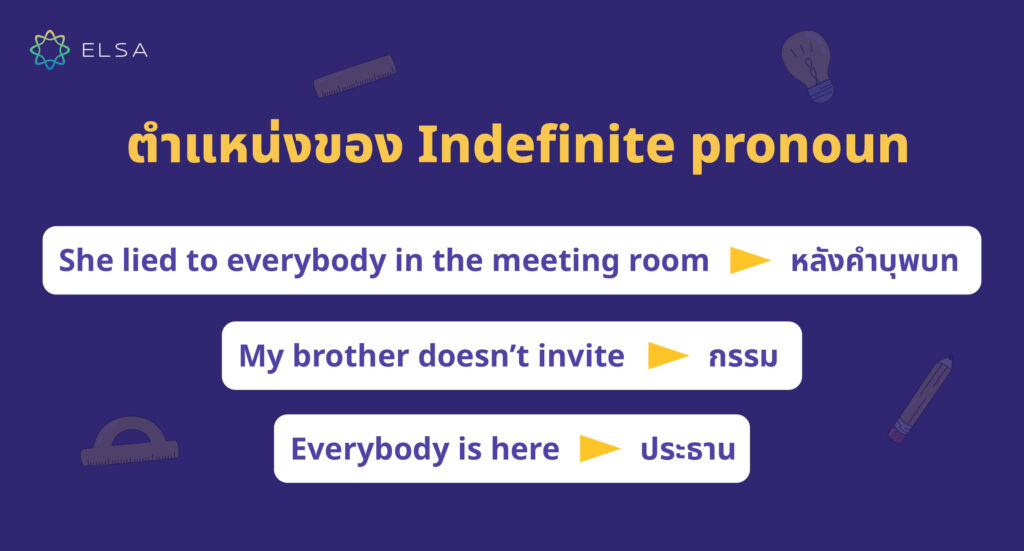
Indefinite pronoun การใช้ยังไง
| เนื้อหา | ตัวอย่าง |
| ผันคำกริยาเอกพจน์หลังสรรพนาม | Everybody loves me. (ทุกคนรักฉัน) |
| พูดซ้ำโดยใช้คำนามพหูพจน์ | No one showed up although I have already notified them. (ไม่มีใครมาถึงแม้ว่าฉันจะแจ้งให้พวกเขาทราบแล้วก็ตาม) |
| เพิ่ม ‘s หลังสรรพนามไม่ชี้เฉพาะเพื่อสร้างความเป็นเจ้าของ | Someone’s phone is ringing. (โทรศัพท์ของใครบางคนดังขึ้น) |
| ใช้ else เพื่อพูดถึงสิ่งอื่น/บุคคล | Nobody else came. (ไม่มีใครมาอีกแล้ว) |

>>> Read more: หลักการเติม s/ es ต่อคำนาม และวิธีออกเสียง s/ es ให้ถูกต้อง
ตาราง Indefinite Pronoun ในภาษาอังกฤษ
Indefinite pronoun มีอะไรบ้าง? ในภาษาอังกฤษ เราแบ่ง Indefinite Pronouns ออกเป็น 3 ประเภท ได้แก่ คน สถานที่ และสิ่งของ คำสรรพนามไม่ชี้เฉพาะประกอบด้วยคำนำหน้า any, some, every และ no เพื่อสื่อถึงความหมายที่แตกต่างกัน โปรดดูตารางต่อไปนี้ของคำสรรพนามไม่ชี้เฉพาะกับ ELSA Speak นะ
Indefinite pronoun เอกพจน์ – บ่งบอกถึงบุคคล
| คำสรรพนาม | แปล | ตัวอย่าง |
| Somebody | ใครบางคน | Somebody is calling you. (มีใครบางคนโทรหาคุณ) |
| Nobody | ไม่มีใคร | Nobody knows the truth. (ไม่มีใครที่รู้ความจริง) |
| Anyone | ใครๆ | Anyone can join the game. (ใครๆ ก็สามารถเข้าร่วมเกมได้) |
| Everybody | ทุกๆ คน | Everybody loves a good story. (ทุกคนล้วนแต่ชอบเรื่องราวดีๆกันทั้งนั้น) |
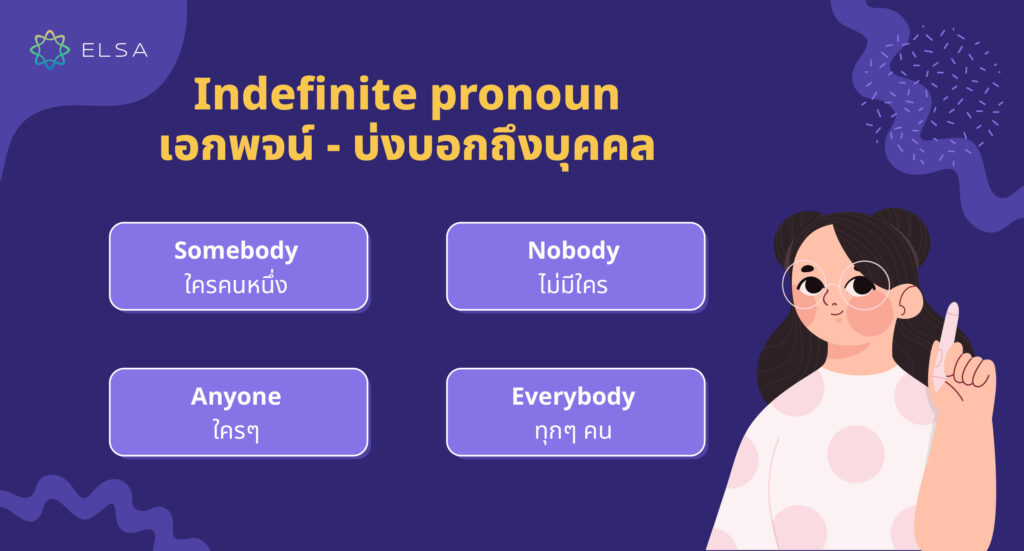
Indefinite pronoun เอกพจน์ – บ่งบอกถึงสิ่งของ
| คำสรรพนาม | แปล | ตัวอย่าง |
| Something | บางสิ่ง บางอย่าง | I need something to drink. (ฉันอยากดื่มอะไรบางอย่าง) |
| Nothing | ไม่มีอะไร | There’s nothing in my bag. (ในกระเป๋าฉันไม่มีอะไร) |
| Anything | อะไรหรืออื่นๆ เพิ่มเติม | Do you want anything else? (คุณอยากได้อะไรเพิ่มเติมไหม?) |

Indefinite pronoun เอกพจน์ – บ่งบอกถึงบุคคลและสิ่งของ
| คำสรรพนาม | แปล | ตัวอย่าง |
| Someone | บางคน | Someone left their jacket over there. (บางคนลืมเสื้อคลุมไว้ที่นั่น) |
| Anyone | ใครๆ | Is there anyone in the room? (มีใครอยู่ในห้องไหม?) |
| Anything | อะไรหรืออื่นๆ เพิ่มเติม | I don’t want anything. (ฉันไม่ต้องการอะไรเลย) |
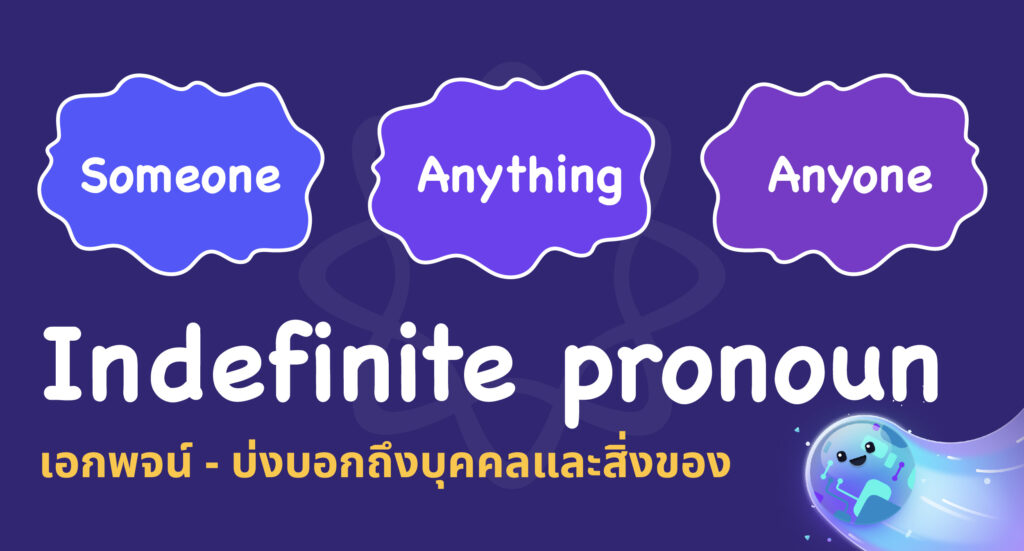
Indefinite pronoun บ่งบอกถึงปริมาณ
| คำสรรพนาม | แปล | ตัวอย่าง |
| All | ทั้งหมด | All of them are coming. (พวกเขาทั้งหมดกำลังมา) |
| Some | บางส่วน | Some students are late. (มีนักเรียนบางคนที่มาสาย) |
| Many | จำนวนมาก | Many people attended the event. (มีผู้เข้าร่วมงานจำนวนมาก) |
| Few | น้อย ไม่มาก | Few students passed the exam. (มีนักเรียนไม่กี่คนที่สอบผ่าน) |
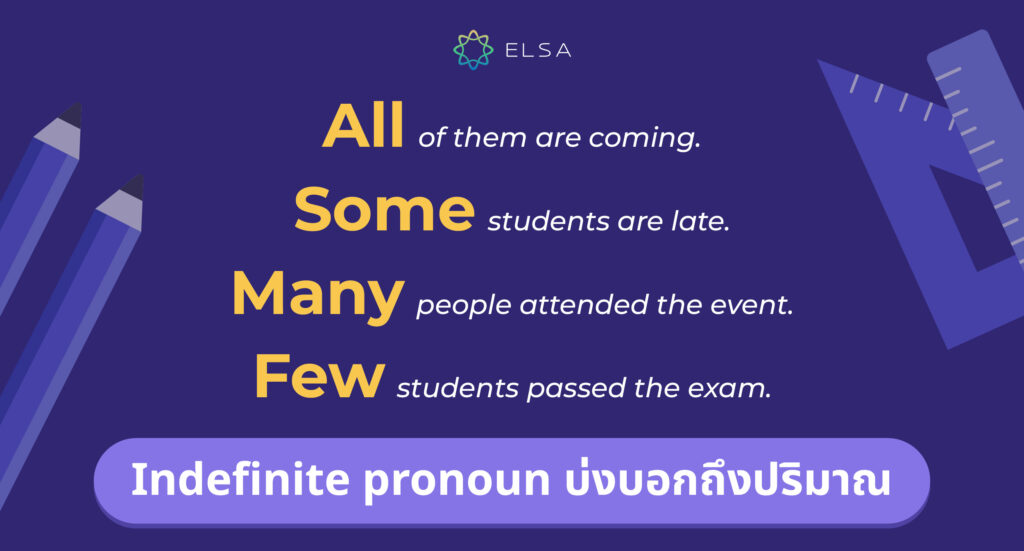
แบบฝึกหัด Indefinite pronoun พร้อมเฉลยอย่างละเอียด (indefinite pronoun exercise)
กรอกข้อมูลลงในช่องว่างในย่อหน้าต่อไปนี้
ข้อที่ 1: In conclusion, the importance of luck in determining goal achievement is overstated, while there are much more significant factors to consider, namely hard work and determination. It is recommended that ______ who wants to pursue their dream should develop a strong will and perseverance.
A. Anyone
B. Someone
C. Somebody
V. Everybody
ข้อที่ 2: There are severe consequences when copyrighted contents are distributed freely for______. This trend may well put the career of many authors, artists, and creative workers in danger, as they receive a significantly lower income from selling their books and songs. Yet this is not only a problem of finance but also an issue of morality. The proclivity of taking others’ work without permission is a form of disregarding their rights and stealing their work. From a broader perspective, when authors’ intellectual property is not respected, they may be less likely to positively contribute to society.
A. Everything
B. No one
C. Anything
D. Everyone

ELSA Premium Lifetime
9,999 บาท ->6,439 บาท

ELSA Pro Lifetime
3,659 บาท ->2,799 บาท

ELSA Premium 1 year
8,497 บาท ->2,885 บาท

ELSA Pro 1 year
2,499 บาท ->1,528 บาท
ข้อที่ 3: Local news is significant to an average person because of a few reasons. The first is that it is immediately relevant to them. This high level of relevancy means that they are more likely to read the news and learn _______ new and interesting in their local area. That can be the opening of a new theme park, the premiere of a new film shown in the cinema, or a special lunch buffet that one may enjoy at the weekend. Local news, furthermore, gets people to know the issues that may have a direct impact on them. News on a recent road blockage near one’s neighborhood, for instance, may help them to choose a better route to their workplace every day.
A. Nothing
B. Something
C. Anything
D. Nobody
เฉลย
| 1. A | 2. D | 3. B |
ข้างต้นเป็นบทความเกี่ยวกับไวยากรณ์ในหัวข้อ Indefinite Pronoun คือ อะไร หวังว่าความรู้ที่ ELSA Speak นำมาแบ่งปันจะช่วยให้คุณพิชิตแบบทดสอบภาษาอังกฤษได้อย่างง่ายดาย
Negative sentences in english เป็นประโยคประเภทหนึ่งที่ใช้บ่อยในการพูดและการเขียน อย่างไรก็ตาม หลายคนคิดว่าการสร้าง negative sentence ในภาษาอังกฤษคือการเติมเพียงคำว่า “not” หลังคำกริยา to be หรือกริยาช่วยเท่านั้น ซึ่งเป็นความเข้าใจที่ผิดและจะนำไปสู่การใช้ประโยคปฏิเสธที่ไม่หลากหลาย มีคําซํ้าง่าย และไม่มีประสิทธิภาพในการสื่อสารภาษาอังกฤษ ดังนั้น ELSA Speak จะช่วยให้เห็นสิ่งที่ควรจำเกี่ยวกับ negative sentence นะ
นิยามและข้อสังเกตเมื่อเจอ negative sentence ในภาษาอังกฤษ

Negative sentence เป็นประโยคประเภทหนึ่งที่ใช้เพื่อแสดงความคิดเห็นว่ามีบางอย่างผิดหรือไม่เป็นความจริง หรือเพื่อแสดงความไม่เห็นด้วยของผู้พูด/ผู้เขียน หรือในแง่พื้นฐานที่สุด Negative sentence แปลว่า “ไม่” โดยปกติแล้ว ประโยคปฏิเสธในภาษาอังกฤษจะถูกสร้างขึ้นโดยการเติมคำว่า “not” เข้าไปในประโยคบอกเล่า
ตัวอย่างประโยคปฏิเสธ (negative sentences examples):
- He does not want to go shopping. (เขาไม่อยากไปช้อปปิ้ง)
- There are not many apples in this summer. (ในฤดูร้อนนี้แอปเปิ้ลมีน้อย)
ดังนั้น ในตัวอย่าง negative sentence ข้างต้น ทั้งสองประโยคจึงมีคำว่า “not” นี่เป็นหนึ่งในข้อสังเกตพื้นฐานในการจดจำประโยคปฏิเสธในภาษาอังกฤษ นอกจากนี้ ยังมีประโยคประเภทต่าง ๆ ที่ดูเหมือนประโยคบอกเล่า (เพราะไม่มีคำว่า “not”) แต่จริง ๆ แล้วมีความหมายเชิงปฏิเสธ
ตัวอย่าง: I hardly eat outside. (ฉันไม่ค่อยกินข้าวนอกบ้าน
ประโยคตัวอย่างนี้มีความหมายเชิงปฏิเสธเนื่องจากมีคำเชิงปฏิเสธ “hardly” ดังนั้น negative sentence จึงสามารถสังเกตได้จากโครงสร้างเชิงปฏิเสธของประโยคหรือคำเชิงปฏิเสธที่มีอยู่ในประโยค
>>> Read more: ประโยคคำถามในภาษาอังกฤษคืออะไร? โครงสร้างคำถามและตัวอย่างที่เข้าใจง่าย
วิธีสร้าง negative sentence ในภาษาอังกฤษ
ในภาษาอังกฤษ ประโยคปฏิเสธถูกสร้างขึ้นโดยการเปลี่ยนโครงสร้างของประโยคบอกเล่าให้เป็นโครงสร้างของประโยคปฏิเสธ ซึ่งสามารถจำแนกออกได้เป็นวิธีพื้นฐานดังต่อไปนี้:
| วิธีสร้างประโยคปฏิเสธในภาษาอังกฤษ | ตัวอย่าง |
| เติม “not” หลังคำกริยา to be หรือเติมหลังกริยาช่วย | She is not watching TV at home, she is dancing with him. (เธอไม่ได้ดูทีวีอยู่ที่บ้าน เธอกำลังเต้นรำกับเขา) |
| ใช้คำเชิงปฏิเสธเพื่ออ้างถึงคำนาม: “no”, “no one”, “nobody”, “none”, “nothing”, “neither”,… | Nobody helped her as they thought she was a liar. (ไม่มีใครช่วยเธอเพราะพวกเขาคิดว่าเธอเป็นคนโกหก) |
| ใช้คำนำหน้า (de-, un-, dis-) หรือคำต่อท้าย (-less) สำหรับคำภาษาอังกฤษบางคำ | That food was unhealthy = That food was not healthy. (อาหารเมนูนั้นไม่ดีต่อสุขภาพ) |
| ใช้คำวิเศษณ์เชิงปฏิเสธ: hardly, rarely, seldom, little,… | They seldom go to school by bus. (พวกเขาไม่ค่อยไปโรงเรียนโดยรถประจำทาง) |
| ใช้โครงสร้างเชิงปฏิเสธ: too…to | This soup is too hot to eat fast this summer. (ซุปนี้ร้อนเกินกว่าจะกินเร็ว ๆ ในหน้าร้อนนี้) |
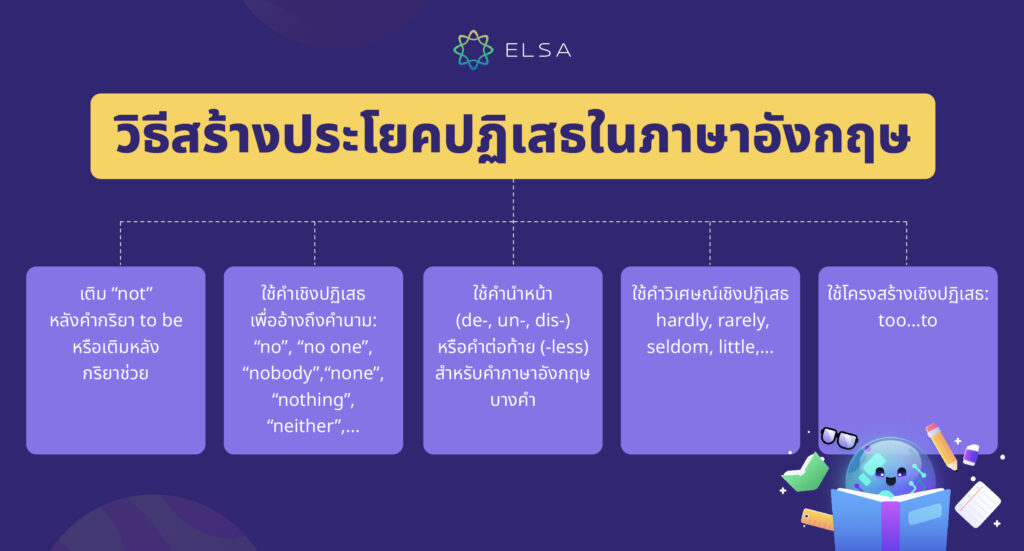
Negative sentence โครงสร้างในภาษาอังกฤษ
โครงสร้าง ประโยคปฏิเสธ มีอะไรบ้าง มาเรียนกันเลย!
ประโยคปฏิเสธในบางกาลในภาษาอังกฤษ
| กาล | โครงสร้าง | ตัวอย่าง | หมายเหตุ |
| กาลปัจจุบัน | S + do/does + not + V-inf + O | I don’t like watching TV all the weekend. (ฉันไม่ชอบดูทีวีในช่วงสุดสัปดาห์) | Do not/Does not สามารถย่อให้สั้นลงได้เป็น don’t/doesn’t |
| ปัจจุบันกาลต่อเนื่อง | S + am/is/are + not + V-ing + O | She is not driving at the moment. (เธอไม่ได้ขับรถในเวลานี้) | Is not/ are not สามารถเขียนเป็น isn’t / aren’t ได้ |
| ปัจจุบันกาลสมบูรณ์ | S + have/has + not + PII + O | You have not finished your homework yet. (คุณยังทำการบ้านไม่เสร็จ) | Have not/ has not สามารถเขียนเป็น haven’t / hasn’t ได้ |
| อดีตกาลธรรมดา | S + did + not + V-inf + O | Jom didn’t stay at home last night. (เมื่อคืนนี้จอมไม่ได้อยู่บ้าน) | Did not สามารถเขียนเป็น didn’t ได้ |
| อดีตกาลต่อเนื่อง | S + was/were + not + V-ing + O | She wasn’t eating dinner when I came her house. (เธอไม่ได้กินข้าวเย็นตอนที่ฉันไปบ้านเธอ) | Was not/were not สามารถเขียนเป็น wasn’t/weren’t ได้ |
| อดีตกาลที่สมบูรณ์ | S + had + not + PII + O | Jom had not been to London before 2022. (จอมไม่เคยไปลอนดอนมาก่อนปี 2022) | Had not สามารถเขียนเป็น hadn’t ได้ |
| อนาคตกาล | S + will + not + V-inf + O | I won’t use that laptop anymore. (ฉันจะไม่ใช้แล็ปท็อปเครื่องนั้นอีกต่อไป) | Will not สามารถเขียนเป็น won’t ได้ |
| กาลอนาคตอันใกล้ | S + am/is/are + not + going to V-inf + O | She is not going to buy that moto next weekend. (เธอจะไม่ซื้อมอเตอร์ไซค์คันนั้นในวันหยุดสุดสัปดาห์หน้า) | Is not/are not สามารถเขียนเป็น isn’t/aren’t. ส่วน am not คงโครงสร้างเดิม |
| คุณรู้ have has ใช้ยังไง ใน tense ภาษาอังกฤษแล้วหรือยัง? อ่านบทความนี้เพื่อเพิ่มความรู้และนำ have, has ไปใช้ให้ถูกต้องในชีวิตประจำวัน |
>>> Read more: 12 tense ในภาษาอังกฤษ: โครงสร้าง หลักการใช้ และสัญญาณการรับรู้
ประโยคปฏิเสธที่มีกริยาช่วย
กริยาช่วยในภาษาอังกฤษ: can, can, would, might, may, have to, ควรจะ, need… และคำเหล่านี้เรียกรวมกันในภาษาอังกฤษว่า Modal Verbs
โครงสร้างประโยคปฏิเสธของกริยาช่วยมีดังนี้:
S + modal verbs + not + Vo + O
นอกจากนี้กริยาช่วยยังสามารถย่อได้ดังนี้: cannot, can’t, don’t/doesn’t have to, couldn’t, needn’t,…
ตัวอย่าง:
- She can’t drive a car. (เธอไม่สามารถขับรถได้)
- He needn’t go to school on time because of his broken legs. (เขาไม่จำเป็นต้องไปโรงเรียนตรงเวลาเนื่องจากขาหัก)
- You mustn’t be late for class. (คุณไม่ควรไปเรียนสาย)
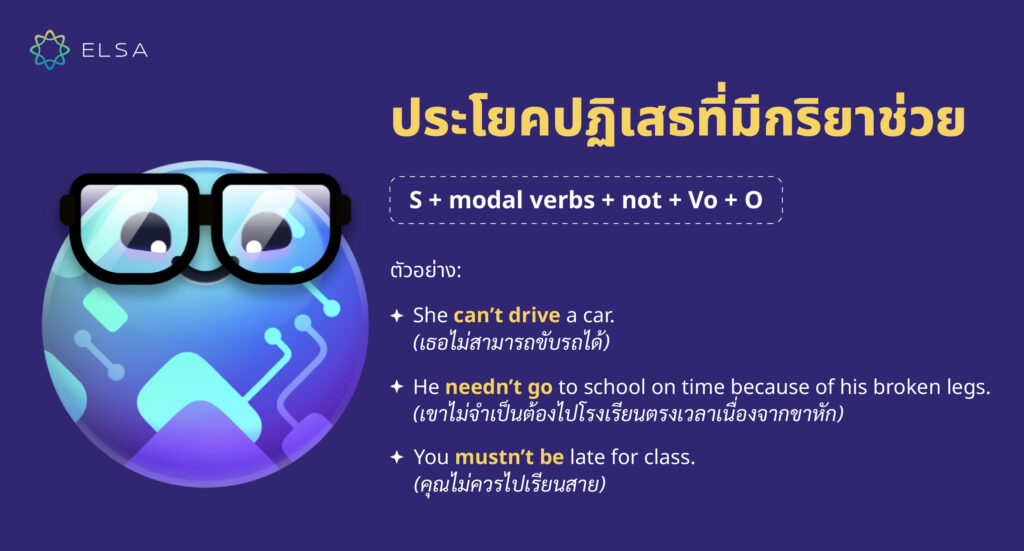
ประโยคคำสั่งในภาษาอังกฤษที่มีความหมายเชิงปฏิเสธ
เพื่อสร้างประโยคปฏิเสธจากประโยคคําสั่งในภาษาอังกฤษ เราจะเติม “not” หลังกริยาช่วย “Do” หรือหลัง “Let’s” (ถ้าประโยคใช้โครงสร้าง Let’s)
โครงสร้าง:
Do/Let’s + not + Vo + O
ตัวอย่าง:
- Do not run over this park = Don’t run over this park. (อย่าวิ่งลัดสวนสาธารณะแห่งนี้)
- Let’s not forget to turn off light. (อย่าลืมปิดไฟด้วย)
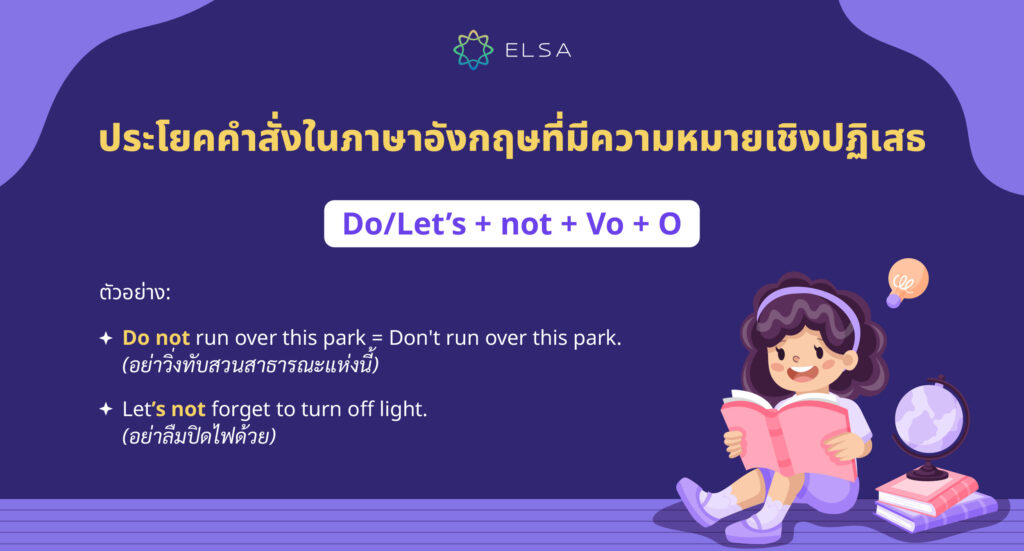
ประโยคปฏิเสธกับ Any และ No
- เราใส่ “any” นำหน้าคำนามภาคแสดงเพื่อเน้นประโยคปฏิเสธ คุณสามารถใช้ no + คํานาม หรือ a single + คำนามเอกพจน์ เพื่อเน้นประโยคปฏิเสธได้
ตัวอย่าง: I don’t have any money. = I have no money. = I don’t have a single dollar. (ฉันไม่มีเงิน)
- Some อยู่ในประโยคบอกเล่าจะถูกเปลี่ยนเป็น any/no + คํานาม/a single + คำนามเอกพจน์ ในประโยคปฏิเสธ
โครงสร้าง:
“Some” อยู่ในประโยคบอกเล่า -> “any/no” + คำนามในประโยคปฏิเสธ
ตัวอย่าง: I have some books => I don’t have any books. (ฉันมีหนังสือบางเล่ม => ฉันไม่มีหนังสือเลย)
ประโยคปฏิเสธคู่ขนาน
โครงสร้างประโยคปฏิเสธแบบคู่ขนานใช้เพื่อเน้นแนวคิดที่ให้ไว้:
ประโยคปฏิเสธ even/still less/much less + คํานาม/คํากริยา : ไม่… ยิ่งไม่
ตัวอย่าง: She doesn’t like playing piano, much less gitar. (เธอไม่ชอบเล่นเปียโนและยิ่งไม่ชอบเล่นกีตาร์)
ประโยคปฏิเสธรวมกับการเปรียบเทียบ
โครงสร้าง:
ปฏิเสธ + เปรียบเทียบชั้นกว่า (more/ less)
= เปรียบเทียบชั้นสุด (ความหมายคือการเปรียบเทียบแบบสัมบูรณ์)
ตัวอย่าง: I couldn’t agree with you more = I absolutely agree with you. (ฉันไม่สามารถเห็นด้วยกับคุณมาก
กว่านี้แล้ว= ฉันเห็นด้วยกับคุณอย่างแน่นอน)
ประโยคปฏิเสธที่ไม่ใช้รูปแบบปฏิเสธของคำกริยา
ในภาษาอังกฤษ มีคำวิเศษณ์บางคำที่มีความหมายเชิงปฏิเสธ เมื่อเราใช้แล้ว เราไม่จำเป็นต้องใช้โครงสร้างเชิงปฏิเสธของคำกริยาในประโยคอีกต่อไป
ตัวอย่าง เช่น:
- Hardly, scarcely, barely = almost nothing/ almost not at all = ไม่ค่อย
- Seldom, hardly ever, rarely = almost never = แทบจะไม่เคยเลย
โครงสร้างที่ 1:
S + คำวิเศษณ์เชิงปฏิเสธ + V
ตัวอย่าง: I hardly ever see her at the church. (ฉันแทบจะไม่เคยเห็นเธอที่โบสถ์เลย)
โครงสร้างที่ 2:
S + to be + คำวิเศษณ์เชิงปฏิเสธ + V
ตัวอย่าง: He is rarely late to work. (เขาไม่ค่อยไปทำงานสาย)

ประโยคปฏิเสธของคำกริยาพิเศษในภาษาอังกฤษ
สำหรับคำกริยา เช่น: believe, think, allowance, Imagine + that + clause เมื่อจะเปลี่ยนเป็นประโยคปฏิเสธ เราต้องเปลี่ยนกริยาช่วยในส่วนแรกเป็นรูปแบบปฏิเสธ และส่วนที่สองจะเป็นรูปแบบบอกเล่าเสมอ
โครงสร้าง:
believe, think, suppose, imagine + that + อนุประโยค
ตัวอย่าง: I don’t believe he will come here. (ฉันไม่เชื่อว่าเขาจะมาที่นี่)
(จะไม่เขียนว่า: I believe he will not come here.)
คำถามในรูปแบบปฏิเสธที่มีความหมายเน้นย้ำ
แม้ว่าประโยคเหล่านี้จะเป็นคำถาม แต่ก็ไม่ได้ใช้เพื่อวัตถุประสงค์ในการถาม แต่เพื่อเน้นความหมายของผู้พูด ดังนั้น เราจะไม่ใส่ “?” ในท้ายของประโยค
- เน้นการยืนยันของผู้พูด:
ตัวอย่าง: Shouldn ‘t you put on your hat, too! (คุณก็ควรใส่หมวกด้วยนะ!)
- ใช้ในการสรรเสริญ:
ตัวอย่าง: Wouldn’t it be nice if we didn’t have to work on Saturday. (จะดีมากถ้าเราไม่ต้องทำงานในวันเสาร์)
ประโยคปฏิเสธกับ “Not … at all; at all”
- Not … at all: ไม่เลย มักจะอยู่ท้ายประโยคปฏิเสธ
ตัวอย่าง: I didn’t understand anything at all. (ฉันไม่เข้าใจอะไรเลย)
- At all: ใช้ในคำถาม
ตัวอย่าง: Do you play piano at all? (คุณเล่นเปียโนบ้างไหม)
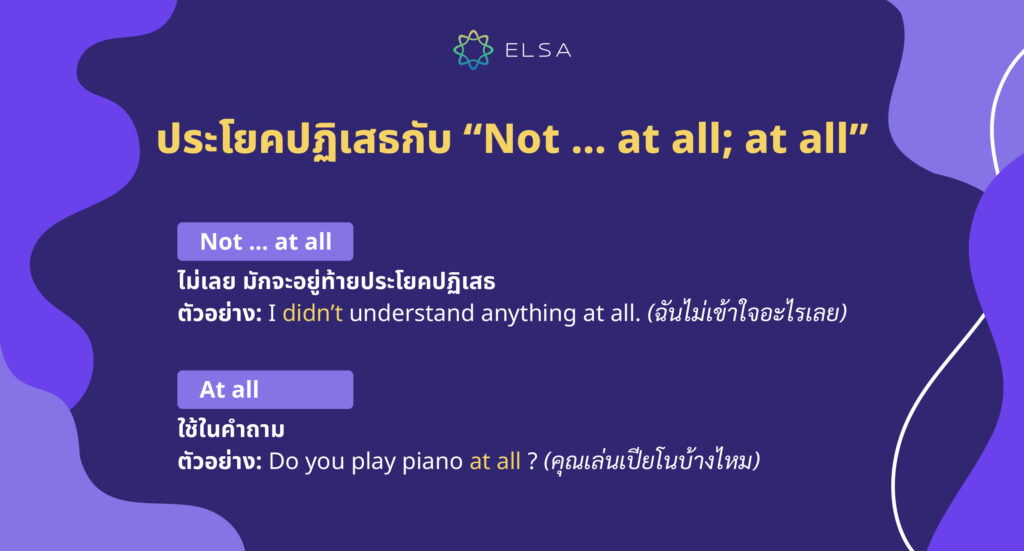
ประโยคปฏิเสธกับ No Matter
โครงสร้าง:
No matter + who/what/which/where/when/how + S + V (ปัจจุบันกาล): ไม่ว่าอะไรก็ตาม
หมายเหตุ:
- No matter who = whoever
- No matter what = whatever
ตัวอย่าง:
No matter how long time passes, I still love her. = Whoever comes into my life, I will still love her no matter how much time passes. (ไม่ว่าเวลาจะผ่านไปนานแค่ไหนฉันยังคงรักเธอ = ใครก็ตามที่เข้ามาในชีวิตฉัน ฉันจะยังคงรักเธอไม่ว่าเวลาจะผ่านไปนานแค่ไหน)

ELSA Premium Lifetime
9,999 บาท ->6,439 บาท

ELSA Pro Lifetime
3,659 บาท ->2,799 บาท

ELSA Premium 1 year
8,497 บาท ->2,885 บาท

ELSA Pro 1 year
2,499 บาท ->1,528 บาท
หมายเหตุในการใช้โครงสร้างปฏิเสธในภาษาอังกฤษ
ปฏิเสธสองครั้ง = บอกเล่า
ถ้าในประโยคมีโครงสร้างหรือคำหรือองค์ประกอบเชิงปฏิเสธสองประการ ประโยคนั้นจะกลายเป็นประโยคบอกเล่า
ตัวอย่าง: Don’t forget to carry on her hat. (อย่าลืมนําหมวกของเธอไปด้วย)
(ในตัวอย่างนี้ มีการปฏิเสธสองประการ: “don’t” และคำเชิงปฏิเสธ “forget” ดังนั้นประโยคจึงสามารถเข้าใจได้ว่า “Remember to take her hat” – ตรงข้ามกับลืม)
คําบ่งชี้ที่ใช้ในประโยคปฏิเสธ
| คําบ่งชี้ | วิธีใช้ | ตัวอย่าง |
| Much – มากเท่าไหร่ | ใช้สำหรับคำนามนับไม่ได้ | She doesn’t have much food to eat. (เธอไม่มีอาหารจะกินมากเท่าไหร้) |
| Many – มากนัก | ใช้สำหรับคำนามนับได้ | Mark doesn’t bring many books to class. (มาร์คไม่ได้นำหนังสือมาเรียนมากนัก) |
| Any – ไม่มีเลย | ใช้สำหรับคำนามนับได้พหูพจน์และคำนามนับไม่ได้ | Her house doesn’t have any visitors this week. (สัปดาห์นี้บ้านของเธอไม่มีแขกมาเยี่ยมเลย) |
| A lot of และ lots of – มาก | สามารถใช้ได้ทั้งประโยคปฏิเสธและประโยคบอกเล่า | Jom doesn’t have lots of/a lot of friends here. (ที่นี่จอมมีเพื่อนไม่มากนัก) |
>>> Read more: การใช้ how much how many ในภาษาอังกฤษ

เคล็ดลับในการใช้ negative sentence ให้เชี่ยวชาญ
เพื่อให้มีความเชี่ยวชาญในการระบุตัวตน (เพื่อทำความเข้าใจว่าอีกฝ่ายหรือผู้เขียนกำลังพูดถึงความคิดเชิงปฏิเสธ) รวมถึงการใช้ประโยคเชิงปฏิเสธในภาษาอังกฤษ เราต้องมีทักษะและเวลาที่จำเป็นในการฝึกฝนเพื่อทำความคุ้นเคยและเชี่ยวชาญ ดังนั้น ELSA Speak ขอแนะนำวิธีต่อไปนี้:
- สิ่งแรกและสำคัญที่สุดคือการเรียนรู้ประโยคปฏิเสธในภาษาอังกฤษ
- ประการที่สอง ใส่ใจกับการเสริมสร้างคลังคำศัพท์ วลีดี ๆ หรือโครงสร้างประโยคที่มีความหมายเชิงปฏิเสธ จดจำและฝึกฝนอย่างสม่ำเสมอเพื่อเพิ่มความสามารถในการจดจำ
- ประการที่สามคือการฝึกฝนและนำสิ่งที่คุณได้เรียนรู้เกี่ยวกับประโยคปฏิเสธไปประยุกต์ใช้ในชีวิตประจำวัน
- ประการที่สี่นี้สามารถนำไปใช้ได้เมื่อสภาพแวดล้อมการใช้ภาษาอังกฤษมีจำกัด ทำให้ยากต่อการควบคุมประโยคปฏิเสธ นั่นก็คือมีส่วนร่วมในการทบทวนและลงทะเบียนสอบภาษาอังกฤษเพราะในการสอบแต่ละครั้งเรามีโอกาสทดสอบซ้ำความสามารถของเราในการจดจำและมีแนวการเรียนรู้จากประสบการณ์อย่างทันท่วงที
วิธีแยกแยะคำถามปฏิเสธและประโยคปฏิเสธ
| ประเภท | โครงสร้าง | ตัวอย่าง | บทบาท |
| คําถามเชิงปฏิเสธ | Auxiliary verb + not + subject + verb…? | Haven’t you been to Paris before? (คุณไม่เคยไปปารีสมาก่อนเหรอ) | แสดงออกถึงความสงสัยหรือความปรารถนาของผู้พูดหรือผู้เขียนที่จะถามคำถาม |
| ประโยคปฏิเสธ | Subject + auxiliary verb + not + verb | I have not been to Paris before. (ฉันไม่เคยไปปารีสมาก่อน) | แสดงการปฏิเสธหรือขัดแย้งกับข้อมูลบางอย่างอย่างชัดเจนโดยไม่มีข้อสงสัย |
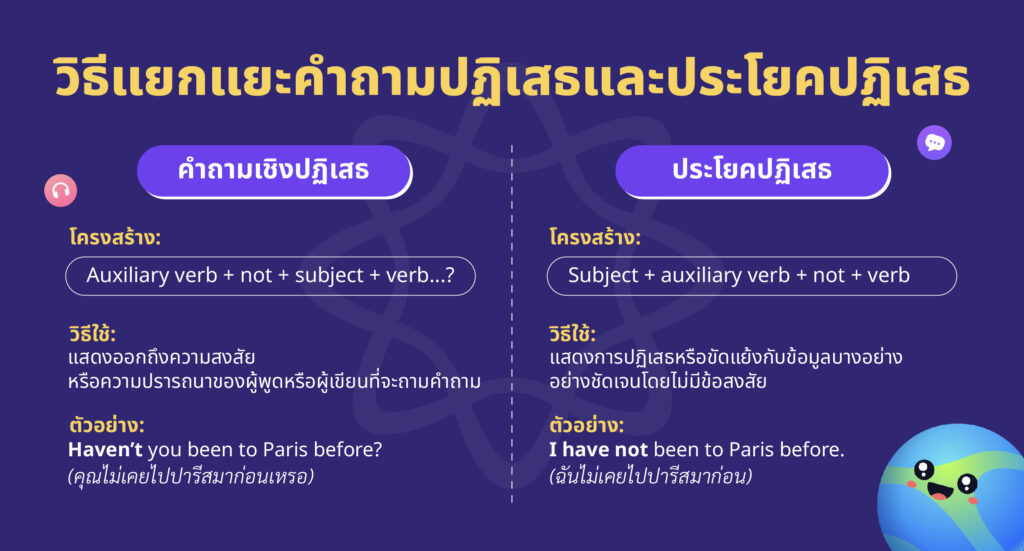
แบบฝึกหัดเกี่ยวกับ negative sentence ในภาษาอังกฤษ
บทที่ 1: จงเปลี่ยนประโยคต่อไปนี้ให้อยู่ในรูปปฏิเสธ
1. He showed a great interest in the offer.
_________________________________________________________ .
2. He admitted that he stole the money.
_________________________________________________________ .
3. There were some cars in the parking lot when he left.
_________________________________________________________ .
4. They were having a meeting when the vice president arrived.
_________________________________________________________ .
5. I have finished working on the project.
_________________________________________________________ .
6. He has been waiting for the train for almost an hour.
_________________________________________________________ .
7. He has a lot of friends back home.
_________________________________________________________ .
8. He has been to Scotland once when he was a child.
_________________________________________________________ .
9. Her car was badly damaged in the accident.
_________________________________________________________ .
10. Her dad wants her to be a doctor.
_________________________________________________________ .
บทที่ 2: จงเรียงคำต่อไปนี้ให้เป็นประโยคที่สมบูรณ์
1. brief / the chairman / wouldn’t / better / initiative / to / it / this / we / be / if / to.
____________________________________________________________________ .
2. weekend / seldom / they / dinner / the / go out / for / on.
____________________________________________________________________ .
3. money / he / arrived / on / didn’t have / when / any / him / the / package.
____________________________________________________________________ .
4. project / going / fair / they’re / on / the / they’re / to / not / working / because / a.
____________________________________________________________________ .
5. December 12 / let’s / sales meeting / about / not / on / forget / the.
____________________________________________________________________ .
เฉลย:
บทที่ 1:
1. He didn’t show any interest in the offer.
2. He didn’t admit that he stole the money.
3. There weren’t any cars in the parking lot when he left.
4. They weren’t having a meeting when the vice president arrived.
5. I haven’t finished working on the project.
6. He hasn’t been waiting for the train.
7. He doesn’t have a lot of friends back home.
8. He has never been to Scotland before. (He hasn’t been to Scotland before.)
9. Her car wasn’t badly damaged in the accident.
10. Her dad doesn’t want her to be a doctor.
บทที่ 2:
1. Wouldn’t it be better if we brief this initiative directly to the chairman.
2. They seldom go out for dinner on the weekend.
3. He didn’t have any money on him when the package arrived.
4. They’re not going to the fair because they’re working on a project.
5. Let’s not forget about the sales meeting on December 12.
ประโยคปฏิเสธและประโยคบอกเล่า (positive sentences and negative sentences) ต่างกันอย่างไร
| เกณฑ์ | ประโยคบอกเล่า | ประโยคปฏิเสธ |
| วัตถุประสงค์ | ยืนยันเหตุการณ์ การกระทำ หรือสถานะ | ปฏิเสธหรือหักล้างเหตุการณ์ การกระทำ หรือสถานะ |
| โครงสร้าง | S + V + O (ประธาน + กริยา + กรรม) | S + กริยาช่วย + not + V + O (ประธาน + กริยาช่วย + Not + กริยา + กรรม) |
| ตัวอย่าง | – She reads books every day.(เธออ่านหนังสือทุกวัน) – They are going to the park.(พวกเขากำลังไปที่สวนสาธารณะ) – He plays football on weekends.(เขาเล่นฟุตบอลในช่วงวันหยุดสุดสัปดาห์) – I have finished my homework.(ฉันทำการบ้านเสร็จแล้ว) – We enjoy watching movies together.(เราชอบดูหนังด้วยกัน) | – She does not read books every day. (เธอไม่ได้อ่านหนังสือทุกวัน) – They are not going to the park. (พวกเขาจะไม่ไปที่สวนสาธารณะ) – He does not play football on weekends. (เขาไม่เล่นฟุตบอลในช่วงวันหยุดสุดสัปดาห์) – I have not finished my homework. (ฉันยังทำการบ้านไม่เสร็จ) – We do not enjoy watching movies together. (เราไม่ชอบดูหนังด้วยกัน) |
>>> Read more: การใช้ Gerund and Infinitive อย่างรายละเอียด เข้าใจง่าย
บทความข้างต้นได้รวบรวมความรู้พื้นฐานทั้งหมดเกี่ยวกับ negative sentence ELSA Speak จะช่วยให้ผู้เรียนทบทวนจาก A-Z ได้อย่างง่ายดายและสามารถนำไปประยุกต์ใช้ประโยคปฏิเสธภาษาอังกฤษชีวิตประจําวันได้ หวังว่าคุณจะเรียนได้อย่างมีประสิทธิภาพ
คำว่า Bored และ Boring มักถูกใช้เพื่ออธิบายถึงความรู้สึก เบื่อ ภาษาอังกฤษ แต่หลายคนยังคงสับสนระหว่างสองคำนี้ การทำความเข้าใจถึงความแตกต่างนี้ไม่เพียงช่วยให้เราสื่อสารได้อย่างมีประสิทธิภาพมากขึ้นเท่านั้น แต่ยังช่วยเพิ่มพูนความสามารถในการแสดงอารมณ์ของเราอีกด้วย ค้นหาวิธีการพูดถึงความเบื่อในภาษาอังกฤษ และอธิบายความแตกต่างระหว่าง Bored และ Boring ไปพร้อมกับ ELSA Speak กันเลย
เบื่อ ภาษาอังกฤษ คืออะไร?

เบื่อเป็นอารมณ์ที่คนทุกคนเคยรู้สึกกัน ในภาษาอังกฤษมีคำศัพท์หลายคำที่สามารถใช้เพื่ออธิบายความรู้สึกนี้ได้ คุณสามารถใช้คำว่า bored เมื่อคุณรู้สึกหมดความสนใจกับสิ่งที่คุณกำลังทำอยู่
ตัวอย่าง:
• We were so bored during the action movie that we fell asleep. (เรารู้สึกเบื่อมากระหว่างดูหนังแอคชั่น จนเราเผลอหลับไป)
• I’m bored at home all day. (ฉันรู้สึกเบื่อเมื่อต้องอยู่บ้านทั้งวัน)
โครงสร้างประโยคกับ Bored
ตัวอย่างโครงสร้างประโยคของคำว่า bored มีดังนี้:
| ประเภทของโครงสร้าง | โครงสร้าง | ตัวอย่าง |
| โครงสร้างพื้นฐาน | S + be + bored | I am bored. (ฉันรู้สึกเบื่อ) |
| โครงสร้างคำบุพบท | S + be + bored + with/about + N/V-ing | She is bored with this book. (เธอรู้สึกเบื่อกับหนังสือเล่มนี้) |
| โครงสร้างคำถาม | Be + S + bored? | Are you bored? (คุณรู้สึกเบื่อไหม?) |
| โครงสร้างปฏิเสธ | S + be + not + bored | He is not bored at the party. (ในงานปาร์ตี้เขาไม่ได้รู้สึกเบื่อ) |
| โครงสร้างประโยคเงื่อนไข | If S + be + bored, S + can + V | If you are bored, you can watch a movie. (ถ้าคุณรู้สึกเบื่อ คุณสามารถดูหนังได้) |
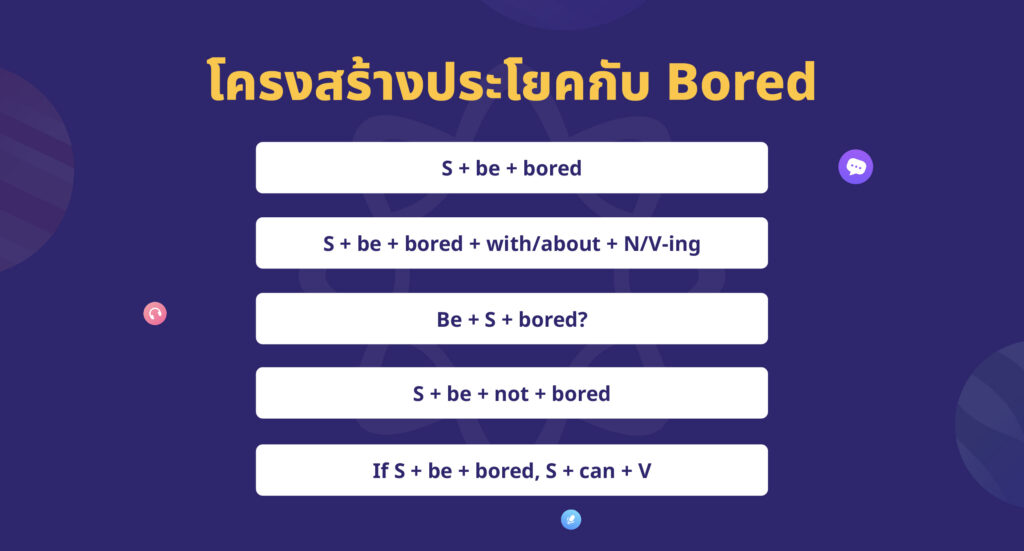
จะพูดอะไรเมื่อรู้สึกเบื่อ?
คุณสามารถดูตัวอย่างประโยคเหล่านี้ได้
| ภาษาอังกฤษ | ความหมาย |
| How boring! | น่าเบื่อจริง ๆ! |
| Too much bother. | น่ารำคาญเกินไป |
| I am (or get) bored. | ฉันรู้สึกเบื่อมาก |
| Life is so boring. | ชีวิตมันน่าเบื่อจริง ๆ |
| My life is so boring. | ชีวิตของฉันมันน่าเบื่อจริง ๆ |
| I am so bored today. | วันนี้ฉันรู้สึกเบื่อมาก |
| I find it rather boring. | ฉันคิดว่ามันค่อนข้างน่าเบื่อ |
| It is awfully boring. | มันน่าเบื่อสุด ๆ |
| I’m dying from boredom. | ฉันเบื่อจนจะตายแล้ว |
| I hate being (or getting) bored. | ฉันเกลียดความรู้สึกเบื่อ |
| That woman is a total bore. | ผู้หญิงคนนั้นน่าเบื่อมาก |
| I get (or am) bored all the time. | ฉันรู้สึกเบื่ออยู่ตลอดเวลา |
| She is (or gets) bored very easily. | เธอเบื่อได้ง่ายมาก |
| I’m fed up with all those nonsense. | ฉันเบื่อกับสิ่งไร้สาระพวกนั้น |
>>> Read more: รวบรวมความรู้ทั้งหมดเกี่ยวกับคำอุทานภาษาอังกฤษ

ประโยคอื่น ๆ ที่พูดถึงความรู้สึกเบื่อ
| ภาษาอังกฤษ | ความหมาย |
| I think I’m a boring person. Do you think so? | ฉันคิดว่าฉันเป็นคนที่น่าเบื่อ คุณคิดแบบนั้นไหม? |
| My cousins are so boring. All they do is playing games on computers. | ลูกพี่ลูกน้องของฉันน่าเบื่อมาก เพราะพวกเขาจะเล่นแต่เกมบนคอมพิวเตอร์เท่านั้น |
| There is nothing to do in the countryside. I’m always bored there. | ที่ชนบทไม่มีอะไรให้ทำเลย ฉันรู้สึกเบื่อทุกครั้งที่อยู่ที่นั่น |
| He was fed up with doing all the work. | เขารู้สึกเบื่อกับการต้องทำทุกอย่าง |
| It’s always boring whenever we go to our relatives. | มันน่าเบื่อทุกครั้งที่เราไปเยี่ยมญาติ |
| I’m sick of her excuses. | ฉันเบื่อกับข้อแก้ตัวของเธอจริง ๆ |
| Traveling during the rush hours can be a bit of a bore. | การเดินทางในช่วงเวลารถติดอาจทำให้น่าเบื่อมาก |
| It’s boring whenever she’s around. | น่าเบื่อทุกครั้งที่เธออยู่ใกล้ ๆ |
| His personality is very boring. | บุคลิกของเขาน่าเบื่อมาก |
| It was not as fun as I thought. It was a little boring. | มันไม่สนุกอย่างที่ฉันคิด มันค่อนข้างน่าเบื่อ |

ELSA Premium Lifetime
9,999 บาท ->6,439 บาท

ELSA Pro Lifetime
3,659 บาท ->2,799 บาท

ELSA Premium 1 year
8,497 บาท ->2,885 บาท

ELSA Pro 1 year
2,499 บาท ->1,528 บาท
ความแตกต่างระหว่าง bored กับ boring
คำว่า bored และ boring มักสร้างความสับสนให้กับใครหลายคน แต่ทั้งสองคำนั้นมีความหมายต่างกัน คุณสามารถดูตารางเปรียบเทียบความแตกต่างด้านล่างนี้
| เกณฑ์ | Bored | Boring |
| การสะกดคำ | /bɔːd/ | /ˈbɔː.rɪŋ/ |
| ความหมาย | มีความหมายเชิงถูกกระทำ (ผลลัพธ์) แสดงความรู้สึกเบื่อเนื่องจากไม่มีสิ่งที่น่าสนใจให้ทำ | มีความหมายเชิงกระทำ (สาเหตุ) แสดงถึงลักษณะน่าเบื่อของบุคคลหรือสิ่งของ |
| ตัวอย่างที่ 1 | I am bored. (ฉันรู้สึกเบื่อ) -> ความรู้สึกนี้เกิดขึ้นชั่วคราว เนื่องจากฉันรู้สึกว่าไม่มีอะไรน่าสนใจ | I am boring. (ฉันเป็นคนที่น่าเบื่อ) -> นี่เป็นบุคลิก / วิถีชีวิตของฉัน ตัวตนของฉันเป็นคนที่น่าเบื่อ ไม่มีอะไรพิเศษ |
| ตัวอย่างที่ 2 | Nobita gets bored of doing a lot of exercises in class. (โนบิตะรู้สึกเบื่อกับการทำแบบฝึกหัดจำนวนมากในห้องเรียน) | Nobita hates boring exercises. (โนบิตะเกลียดแบบฝึกหัดที่มันน่าเบื่อ) |

วลีภาษาอังกฤษอื่น ๆ ที่มีความหมายเหมือนกับ bored และ boring
นอกเหนือจากคำว่า bored และ boring ยังมีวลีภาษาอังกฤษอื่น ๆ ที่ใช้แสดงความรู้สึกเบื่อได้อีกด้วย ซึ่งมีหลายคำที่น่าสนใจ ได้แก่:
| วลี | ความหมาย | ตัวอย่าง |
| I’m fed up | หมายถึงคุณรู้สึกเบื่อกับบางสิ่ง | I’m fed up with this routine. (ฉันเบื่อกับกิจวัตรนี้) |
| I’m tired of it | แสดงถึงความรู้สึกเหนื่อยจากการทำกิจกรรมหรือต้องอยู่ในสถานการณ์ใด ๆ ต่อไป | I’m tired of waiting for the bus. (ฉันเบื่อการรอรถบัส) |
| It’s all the same to me | หมายถึงคุณไม่รู้สึกสนใจในตัวเลือกใด ๆ | Whether we go to the beach or the mountains, it’s all the same to me. (ไม่ว่าเราจะไปชายหาดหรือภูเขา ฉันก็รู้สึกเบื่อเหมือนกันหมด) |
| I can’t stand it anymore | แสดงถึงระดับความเบื่อจนไม่สามารถทนได้อีกต่อไป | I can’t stand this noise anymore. (ฉันทนเสียงนี้ไม่ไหวแล้ว) |
| Dull | คล้ายกับ boring หมายถึงสิ่งใดหรือคนใดที่ไม่น่าสนใจ | That performance was so dull, I would rather watch paint dry. (การแสดงนั้นน่าเบื่อมาก ขนาดที่คิดว่าให้ไปนั่งรอสีเพ้นท์บนผ้าใบแห้งยังจะสนุกกว่า) |
| Blah | ใช้เมื่อพูดถึงสิ่งที่ไร้สาระหรือน่าเบื่อมาก มักใช้ในบริบทไม่เป็นทางการกับเพื่อนหรือครอบครัว | The movie was just so blah. I wish I could get my money back. (หนังเรื่องนั้นน่าเบื่อสุด ๆ ฉันอยากได้เงินคืนเลย) |
| Uninterested/Uninteresting | Uninterested หมายถึงการไม่รู้สึกสนใจหรืออยากรู้ให้ชัดเจน ในขณะที่ Uninteresting หมายถึงบางสิ่งที่ไม่กระตุ้นความสนใจหรือความอยากรู้อยากเห็น | She was uninterested in the TV show, so she kept checking her phone instead of watching. (เธอไม่สนใจรายการทีวี จึงมาดูโทรศัพท์แทน) |
| Unamused/Unamusing | มีความหมายว่าน่าเบื่อ | She looked unamused; I guess she didn’t think the joke was very funny. (เธอดูไม่ขำเลย ฉันเดาว่าเธอคงไม่คิดว่ามุขนี้จะตลก) No one laughed at the unamusing jokes . (ไม่มีใครหัวเราะกับเรื่องตลกที่น่าเบื่อเหล่านี้เลย) |
| Listless | คำคุณศัพท์นี้ใช้เพื่อแสดงถึงความรู้สึกหมดเรี่ยวแรงหรือไม่กระตือรือร้น | After hours of waiting, he became listless and started drawing in his notebook. (หลังจากรอนานหลายชั่วโมง เขารู้สึกหมดเรี่ยวแรงและเริ่มวาดรูปลงในสมุด) |
| Jaded | แสดงถึงคนที่เบื่อ เหน็ดเหนื่อยหรือหมดพลัง | They were jaded after working in the same simple job for years. (พวกเขาเบื่อหลังจากทำงานเดิม ๆ มาหลายปี) |
| Unenthused | แสดงถึงการไม่รู้สึกตื่นเต้นหรือไม่กระตือรือร้นเกี่ยวกับอะไรบางอย่าง | His unenthused reaction to the party was normal since he’s not comfortable around large groups of people. (การตอบสนองที่ไม่ค่อยกระตือรือร้นของเขาในปาร์ตี้นั้นเป็นเรื่องปกติ เพราะเขาไม่สบายใจเมื่ออยู่ท่ามกลางคนหมู่มาก) |
| Bored stiff | ไม่มีความสุขเพราะมีบางอย่างไม่น่าสนใจ/คุณไม่มีอะไรเพื่อทำ | They were bored stiff at Chitaphon’s house. (พวกเขาเบื่อมากที่อยู่ที่บ้านของชิตาพอน) |
| Bored to death | เบื่อสุด ๆ หรือเบื่อจนรู้สึกสิ้นหวัง โกรธจัด เศร้าแทบตาย… | I pretended to listen, but I was bored to death. (ฉันแกล้งฟัง แต่จริง ๆ แล้วฉันเบื่อจะตายอยู่แล้ว) |
| Mind-numbing | น่าเบื่อสุด ๆ | This is a mind-numbing conversation. (นี่คือบทสนทนาที่น่าเบื่อสุด ๆ) |
| Uneventful | ไร้สีสัน ไม่น่าตื่นเต้น | This climbing trip was an uneventful journey. (การปีนเขาครั้งนี้เป็นการเดินทางที่น่าเบื่อจริงๆ) |
| Repetitive | สิ่งที่ซ้ำไปซ้ำมา น่าเบื่อ | My manager give me a repetitive job. (ผู้จัดการของฉัน ชอบให้ฉันทำงานซ้ำๆ ซากๆ) |
>>> Read more: เป็นห่วง ภาษาอังกฤษ : 30+ วิธีแสดงความเป็นห่วงและคุณศัพท์อธิบายอื่น
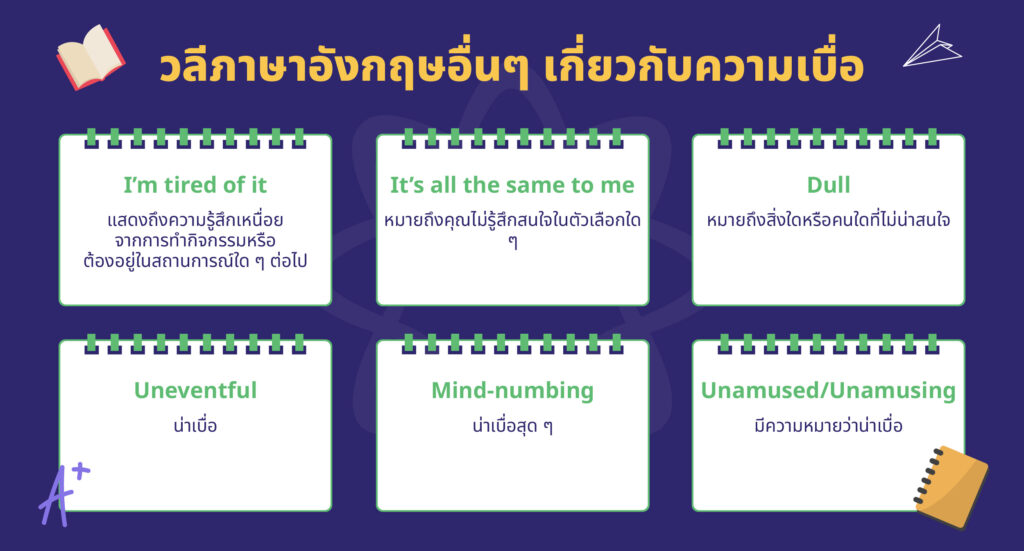
คำถามที่พบบ่อย
Bored ใช้กับคำบุพบทใด?
Bored มักใช้ร่วมกับบุพบท with หรือ of
ตัวอย่าง:
My brother was getting bored with doing the same thing every day. (พี่ชายของฉันรู้สึกเบื่อกับการทำสิ่งเดิม ๆ ทุกวัน)
She is bored of the same routine. (เธอรู้สึกเบื่อกับกิจวัตรเดิม ๆ)
Bored อ่านว่าอย่างไร?
คำว่า “bored” อ่านออกเสียงว่า /bɔːrd/ สำหรับการอ่านที่ถูกต้อง สามารถแบ่งเป็นขั้นตอนดังนี้: เริ่มด้วยเสียง “b” เบา ๆ ตามด้วยเสียง “ɔː” ซึ่งคล้ายกับเสียง “o” ที่ลากยาว และจบด้วยเสียง “rd” เบา ๆ คุณสามารถฝึกได้โดยการฟังตัวอย่างจากเจ้าของภาษา หรือใช้แอปพลิเคชันฝึกการออกเสียงเพื่อพัฒนาทักษะการอ่านของตัวเอง

ฉันเบื่อ ภาษาอังกฤษ คืออะไร?
I’m bored.
รู้สึกเบื่อ ภาษาอังกฤษ คืออะไร?
Feeling bored.
ชีวิตที่น่าเบื่อ ภาษาอังกฤษ คืออะไร?
Life is boring.
เป็นวันที่น่าเบื่อ ภาษาอังกฤษ คืออะไร?
It’s a boring day.
ไม่เบื่อ ภาษาอังกฤษ คืออะไร?
Never bored.
เบื่อ ภาษาอังกฤษ เขียนยังไง?
Bored.
การเข้าใจความแตกต่างระหว่าง bored กับ boring และ เบื่อ ภาษาอังกฤษ จะช่วยให้เราสื่อสารภาษาอังกฤษได้อย่างถูกต้องและมั่นใจมากขึ้น ลองนำความรู้นี้ไปปรับใช้ในชีวิตประจำวัน เพื่อพัฒนาทักษะภาษาอังกฤษของเราเอง การฝึกฝนผ่านแอปพลิเคชันอย่าง ELSA Speak จะช่วยให้คุณพูดภาษาอังกฤษได้คล่องขึ้น ซึ่งจะทำให้สามารถแสดงอารมณ์ความรู้สึกได้อย่างชัดเจนและมีประสิทธิภาพมากขึ้น
หากภาษาอังกฤษเรียกว่าการเดินทางที่คุณต้องพิชิต ไวยากรณ์ภาษาอังกฤษถือเป็น “สัมภาระ” ที่ขาดไม่ได้สำหรับการเดินทางอันยาวนานนี้ “คลังไวยากรณ์” ที่แข็งแกร่งจะเป็นรากฐานที่จะช่วยให้คุณก้าวไปสู่เส้นทางพิชิตภาษาอังกฤษได้อย่างมั่นคงยิ่งขึ้น ในบทความวันนี้ เราจะมาเรียนรู้ ไวยากรณ์ภาษาอังกฤษเบื้องต้น กับ ELSA Speak เพื่อให้คุณมั่นใจมากขึ้นเมื่อแต่งประโยคภาษาอังกฤษ
ไวยากรณ์ภาษาอังกฤษ เรื่อง tense
มาเรียน ไวยากรณ์ภาษาอังกฤษ ทั้งหมด ที่นี่เลย
Present Simple Tense
คำจำกัดความ: ปัจจุบันกาลใช้เพื่อแสดงความจริงที่ชัดเจนหรือการกระทำที่เป็นนิสัยและซ้ำซาก…
หลักการใช้ไวยากรณ์:
- บรรยายนิสัยหรือการกระทำซ้ำๆ
- บรรยายความจริงที่ชัดเจน
- บรรยายเหตุการณ์ที่มีการวางแผนไว้ล่วงหน้าและจะเกิดขึ้นในอนาคต (ตารางเวลา กำหนดการที่กำหนดไว้ล่วงหน้า)
- บรรยายความสามารถของบุคคล
- ใช้ในประโยคเงื่อนไขประเภท 1 ที่มีคำว่า “if”
โครงสร้าง
ด้วยคำกริยาที่วไป:
| (+) S + V(s/es) + O (-) S + don’t/ doesn’t + V + O (?) Do/Does + V + O? |
ด้วยคำกริยา “tobe”:
| (+) S + am/ are/ is + N/ Adj (-) S + am/ are/ is + not + N/ Adj (?) Am/ Are/ is + S + N/ Adj? (?) WH-word + am/ are/ is + S +…? |
- S: ประธาน
- V: กริยา
- N: คำนาม
- Adj: คำคุณศัพท์
- WH-word: คำขึ้นต้นด้วย “Wh” (What, Where, Which,…)
ตัวอย่าง:
Henry does not study hard. (เฮนรี่ไม่ได้เรียนหนัก)
Do you usually play badminton? (ปกติคุณเล่นแบดมินตันไหม?)

Present Continuous Tense
คำจำกัดความ: ใช้เพื่อบรรยายเหตุการณ์หรือการกระทำที่เกิดขึ้นในเวลาพูดหรือรอบเวลาพูดและการกระทำนั้นยังไม่สิ้นสุดในขณะที่พูด
หลักการใช้ไวยากรณ์:
- บรรยายการกระทำที่กำลังเกิดขึ้นในขณะที่พูด (หรือไม่จำเป็นในขณะที่พูด แต่คงอยู่เป็นประจำในปัจจุบัน)
- บรรยายการดำเนินการที่วางแผนไว้และที่กำลังจะเกิดขึ้น
- บรรยายการกระทำที่ทำซ้ำหลายครั้ง การกระทำนี้ทำให้ผู้พูดรู้สึกไม่สบายใจ
- บรรยายการเปลี่ยนแปลงไปในทิศทางที่พัฒนามากขึ้น
โครงสร้าง:
| (+) S + am/ are/ is + Ving + O (-) S + am/ are/ is + not + Ving + O (?) Am/ are/ is + S + Ving + O? |
O: กรรม
ตัวอย่าง:
Is Jane watching a movie? (เจนกำลังดูหนังอยู่เหรอ?)
My mother is not wearing a coat. (แม่ฉันไม่ได้สวมเสื้อกันหนาว)
| ก่อนเริ่มใช้ Present Continuous Tense ลองทบทวน หลักการเติม ing ให้แม่นยำ จะช่วยให้คุณแต่งประโยคได้เร็วและถูกต้องมากขึ้น |
Present Perfect Tense
คำจำกัดความ: ใช้เพื่อบรรยายการกระทำที่เกิดขึ้นในอดีตต่อเนื่องจนถึงปัจจุบันหรือในอนาคต กาลนี้ใช้เพื่อเน้นผลลัพธ์ของการกระทำจนถึงปัจจุบัน มักใช้ร่วมกับคำวิเศษณ์บอกเวลา เช่น: for, since, until,…
หลักการใช้ไวยากรณ์:
- บรรยายเหตุการณ์ที่เกิดขึ้นแต่ไม่ได้ระบุเวลา
- บรรยายการกระทำหรือเหตุการณ์ที่เพิ่งเกิดขึ้น
- บรรยายถึงการกระทำและเหตุการณ์ที่เกิดขึ้นในอดีตและต่อเนื่องมาถึงปัจจุบันและอาจเกิดขึ้นในอนาคต
- บรรยายประสบการณ์ที่เกิดขึ้นจากอดีต
โครงสร้าง:
| (+) S + have/ has + Ved/PII + O (-) S + have/ has + not + Ved/PII + O (?) Have/ has + S + V-ed/PIII + O? |
VPII: กริยาช่อง 2
ตัวอย่าง:
My family has lived in Los Angeles for 3 years. (ครอบครัวของฉันอาศัยอยู่ในลอสแองเจลิสมาเป็นเวลา 3 ปีแล้ว)
Jane has not seen Tommy since 2010. (เจนไม่ได้เจอทอมมี่เลยตั้งแต่ปี 2010)
Present Perfect Continuous Tense
คำจำกัดความ: ใช้เพื่อบรรยายการกระทำหรือเหตุการณ์ที่เริ่มต้นในอดีตต่อเนื่องมาจนถึงปัจจุบัน และอาจดำเนินต่อไปในอนาคตแทนที่เน้นผลลัพธ์ของการกระทำ กาลนี้ใช้เพื่อเน้นกระบวนการของการกระทำเป็นหลัก
หลักการใช้ไวยากรณ์:
- บรรยายการกระทำและเหตุการณ์ที่เกิดขึ้นในอดีตและยังคงเกิดขึ้นในปัจจุบัน (เน้นความต่อเนื่องของการกระทำ)
- บรรยายถึงการกระทำหรือเหตุการณ์ที่เกิดขึ้นและเพิ่งจบลงแต่ผลของการกระทำหรือเหตุการณ์นั้นยังคงเห็นได้ในปัจจุบัน (เน้นผลการกระทำ)
- มักไม่ใช้กับกริยาแสดงสถานะ เช่น “have”, “be” หรือ “know”
โครงสร้าง:
| (+) S + have/ has + been + Ving + O (-) S + have/ has + not + been + Ving + O (?) Have/ has + S + been + Ving + O? |
ตัวอย่าง:
Tom has been reading this novel since he bought it. (ทอมอ่านนวนิยายเรื่องนี้มาตั้งแต่ที่เขาซื้อมันมา)
Jenny has not been playing badminton since 2021. (เจนนี่ไม่ได้เล่นแบดมินตันเลยตั้งแต่ปี 2021)
Past Simple Tense
คำจำกัดความ: ใช้เพื่ออธิบายเหตุการณ์ที่เกิดขึ้นและสิ้นสุด ณ เวลาใดเวลาหนึ่งในอดีต ข้อสังเกตของกาลนี้คือคำกริยาวิเศษณ์: yesterday, ago, last week, last night, last month,…
หลักการใช้ไวยากรณ์:
- บรรยายเหตุการณ์หรือการกระทำที่เกิดขึ้นในเวลาที่กำหนดในอดีตและสิ้นสุดในอดีต
- บรรยายการกระทำหรือเหตุการณ์ที่เกิดขึ้นซ้ำๆ ในอดีต
- บรรยายถึงการกระทำที่เกิดขึ้นอย่างต่อเนื่องในอดีต
- บรรยายการกระทำที่เข้ามาแทรกแซงท่ามกลางการกระทำที่เกิดขึ้นในอดีต
- ใช้สำหรับประโยคเงื่อนไขประเภท II
- ใช้สำหรับความปรารถนาที่ไม่เป็นจริง
- ใช้เมื่อในประโยคมี for + ระยะเวลาในอดีต
- ใช้เมื่อคุณต้องการบรรยายเหตุการณ์ทางประวัติศาสตร์
- ใช้เมื่อการกระทำเกิดขึ้นอย่างชัดเจนในเวลาที่กำหนด แม้ว่าจะไม่ได้กล่าวถึงเวลานั้นก็ตาม
โครงสร้าง:
ด้วยคำกริยาทั่วไป:
| (+) S + V2/ Ved + O (-) S + did not/ didn’t + V + O (?) Did + S + V + O? |
ด้วยคำกริยา “tobe”:
| (+) S + was/ were + N/ Adj (-) S + was/ were + not + N/ Adj (?) Was/ Were + S + N/ Adj? (?) WH-word + was/ were + S (not) + N/ Adj? |
ตัวอย่าง:
My sister visited the BangKok museum last month. (น้องสาวฉันไปเยี่ยมชมพิพิธภัณฑ์กรุงเทพฯ เมื่อเดือนที่แล้ว)
Henry didn’t go to school yesterday. (เมื่อวานนี้เฮนรี่ไม่ได้ไปโรงเรียน)
Past Continuous Tense
คำจำกัดความ: Past continuous tense ใช้เพื่อพูดถึงการกระทำที่เกิดขึ้นในเวลาเดียวกันในช่วงเวลาหนึ่งในอดีตหรือการกระทำที่กำลังเกิดขึ้นและถูกขัดจังหวะด้วยการกระทำหรือเหตุการณ์อื่น
หลักการใช้ไวยากรณ์:
- บรรยายการกระทำที่เกิดขึ้นในช่วงเวลาหนึ่งในอดีต
- บรรยายการกระทำที่เกิดขึ้นในเวลาเดียวกันในอดีต
- บรรยายการกระทำที่เกิดขึ้นเมื่อการกระทำอื่นเข้ามาแทรกแซง
- บรรยายถึงการกระทำที่เกิดขึ้นซ้ำๆ ในอดีต และรบกวนผู้อื่น
โครงสร้าง:
| (+) S + was/ were + Ving + O (-) S + was/ were + not + Ving + O (?) Was/ were + S + Ving + O? |
ตัวอย่าง:
Henry was watching his favorite TV show at 8 p.m yesterday evening. (เมื่อวานตอนเย็นเฮนรี่กำลังดูรายการทีวีโปรดของเขาตอน 20.00 น.)
They weren’t keeping silent when their teacher came in. (พวกเขาไม่ได้นิ่งเงียบเมื่อครูของพวกเขาเข้ามา)
Past Perfect Tense
คำจำกัดความ: ใช้เพื่อบรรยายการกระทำที่เกิดขึ้นก่อนการกระทำอื่นในอดีต
หลักการใช้ไวยากรณ์:
- บรรยายการกระทำหรือเหตุการณ์ที่เกิดขึ้นและเสร็จสิ้นก่อนการกระทำหรือเหตุการณ์อื่นในอดีต
- บรรยายการกระทำหรือเหตุการณ์ที่เกิดขึ้นและคงอยู่จนถึงช่วงระยะเวลาหนึ่งในอดีต
- บรรยายการกระทำหรือเหตุการณ์ที่เกิดขึ้นก่อนช่วงเวลาหนึ่งในอดีต
- บรรยายการกระทำที่เกิดขึ้นเป็นเงื่อนไขแรกสำหรับการกระทำอื่นในอดีต
- บรรยายเงื่อนไขที่ไม่มีอยู่ในอดีตของประโยคเงื่อนไขประเภทที่ 3
- แสดงความผิดหวังกับสิ่งที่เกิดขึ้นในอดีต
โครงสร้าง:
| (+) S + had + Ved/PII + O (-) S + had + not + Ved/PII + O (?) Had + S + Ved/PII + O? |
ตัวอย่าง:
My family had used that washing machine for six years before it was out of order. (ครอบครัวของฉันใช้เครื่องซักผ้าเครื่องนี้มา 6 ปีก่อนที่จะเสีย)
Henry would have come to Jenny’s birthday party if he hadn’t missed the flight. (เฮนรี่คงจะมางานวันเกิดของเจนนี่ได้ ถ้าเขาไม่ตกเที่ยวบิน)
Past Perfect Continuous Tense
คำจำกัดความ: ใช้เมื่อต้องการเน้นย้ำถึงความต่อเนื่องของการกระทำซึ่งเป็นเหตุการณ์ที่เกิดขึ้นก่อนการกระทำอื่นในอดีต
หลักการใช้ไวยากรณ์:
- บรรยายถึงการกระทำที่เกิดขึ้นในอดีตและต่อเนื่องมาจนถึงกาลครั้งหนึ่งในอดีต
- บรรยายการกระทำหรือเหตุการณ์ที่เป็นสาเหตุของการกระทำหรือเหตุการณ์อื่นในอดีต
- บรรยายการกระทำที่เกิดขึ้นก่อนการกระทำอื่นในอดีต (เน้นความต่อเนื่องของการกระทำก่อนการกระทำครั้งต่อไป)
- บรรยายการกระทำหรือเหตุการณ์ที่เกิดขึ้นเป็นหลักฐานสำหรับการกระทำหรือเหตุการณ์อื่น
โครงสร้าง:
| (+) S + had + been + Ving + O (-) S + had + not + been + Ving + O (?) Had + S + been + Ving + O? |
ตัวอย่าง:
My sister had been studying since 3:00 p.m before my parents came home. (พี่สาวของฉันเรียนหนังสือมาตั้งแต่บ่ายสามโมงก่อนที่พ่อแม่จะกลับบ้าน)
Jane hadn’t been cleaning her room when her parents came home. (เจนไม่ได้ทำความสะอาดห้องของเธอตอนพ่อแม่ของเธอกลับมาบ้าน)
Future Simple Tense
คำจำกัดความ: ใช้เมื่อไม่มีแผนที่จะทำอะไรก่อนที่เราจะพูด แสดงการตัดสินใจที่เกิดขึ้นเองในขณะที่พูด
หลักการใช้ไวยากรณ์:
- เพื่อพูดคุยเกี่ยวกับแผนการที่ตัดสินใจในขณะที่พูด
- ทำข้อเสนอ คำขอ ข้อเสนอ สัญญา
- เป็นการแสดงออกถึงการทำนายที่ไม่แน่นอนหรือไม่มีมูลความจริง
- การข่มขู่หรือตักเตือน
โครงสร้าง:
| (+) S + will/ shall + V + O (-) S + will/ shall + not + V + O (?) Will/ shall + S + V + O? |
ตัวอย่าง:
Jane promises she will visit her grandmother next month. (เจนสัญญาว่าเธอจะไปเยี่ยมคุณยายของเธอในเดือนหน้า)
Will you clean the room? (คุณจะทำความสะอาดห้องไหม?)
Near future / To be going to
คำจำกัดความ: ใช้พูดถึงการตัดสินใจหรือแผนการที่เตรียมไว้ล่วงหน้า เพื่อแสดงแผนการที่ยังไม่ได้เกิดขึ้นในอดีต หรือเพื่อแสดงการคาดการณ์บางอย่าง
หลักการใช้ไวยากรณ์:
- บรรยายถึงการกระทำที่กำลังจะเกิดขึ้นในอนาคตอันใกล้นี้
- เป็นการแสดงออกถึงการทำนายของผู้พูด (โดยไตร่ตรองไว้ล่วงหน้าหรือมีแนวโน้มสูง)
- บรรยายถึงแผนการจากอดีตที่ยังไม่เกิดขึ้นจริง
โครงสร้าง:
| (+) S + be + going to + V + O (-) S + be + not + going to + V + O (?) Be + S + going to + V + O? |
ตัวอย่าง:
Tomorrow we are going to visit my friends in Da Nang. We have just bought the ticket. (พรุ่งนี้เราจะไปเยี่ยมเพื่อนที่ดานัง เราเพิ่งซื้อตั๋วมา)
Henry is going to walk to school if his father cannot repair his bike. (เฮนรี่จะต้องเดินไปโรงเรียนถ้าพ่อของเขาซ่อมจักรยานของเขาไม่ได้)
Future Continuous Tense
คำจำกัดความ: ใช้เพื่อบรรยายการกระทำหรือเหตุการณ์บางอย่างที่จะเกิดขึ้นในเวลาที่กำหนดในอนาคต
หลักการใช้ไวยากรณ์:
- เน้นการกระทำหรือเหตุการณ์ที่กำลังจะเกิดขึ้นในช่วงเวลาหนึ่งในอนาคต
- เน้นย้ำว่าการกระทำหรือเหตุการณ์บางอย่างกำลังเกิดขึ้นเมื่อการกระทำหรือเหตุการณ์อื่นเข้ามาแทรกแซงในอนาคต
- เน้นย้ำว่าการกระทำหรือเหตุการณ์หนึ่งจะเกิดขึ้นและดำเนินต่อไปอย่างต่อเนื่องเป็นระยะเวลาหนึ่งในอนาคต
- เน้นการดำเนินการที่จะเกิดขึ้นโดยเป็นส่วนหนึ่งของแผน
โครงสร้าง:
| (+) S + will + be + Ving + O (-) S + will + not + be + Ving + O (?) Will + S + be + Ving + O? |
ตัวอย่าง:
Henry will be waiting at school at 5 PM tomorrow. (พรุ่งนี้เฮนรี่จะรอที่โรงเรียนตอน 5 โมงเย็น)
We won’t be having dinner at home when the film starts. (เราจะไม่รับประทานอาหารเย็นที่บ้านเมื่อภาพยนตร์เริ่มฉาย)
>>> Read more: วิธีใช้ AM PM อย่างถูกต้องในภาษาอังกฤษ
ไวยากรณ์ภาษาอังกฤษเกี่ยวกับชนิดของคำ
คำนามภาษาอังกฤษ (noun)
คำนามใช้เพื่ออ้างถึงบุคคล สิ่งของ และเหตุการณ์ต่างๆ สามารถยืนในตำแหน่งต่าง ๆ ในประโยคได้รวมทั้งประธานและกรรม
| คำจำกัดความ | ตัวอย่าง | |
| คำนามทั่วไป | คำนามทั่วไปเป็นคำนามประเภทหนึ่งที่ใช้เรียกกลุ่มคน สิ่งของ ปรากฏการณ์โดยทั่วไปและมีลักษณะบางอย่างเหมือนกัน | a camera, sneakers, a river,… |
| คำนามเฉพาะ | คำนามเฉพาะเป็นคำนามประเภทหนึ่งที่อ้างถึงชื่อเฉพาะของบุคคล สถานที่ วัตถุ หรือสิ่งของ คำนามเฉพาะจะต้องเป็นตัวพิมพ์ใหญ่เสมอ | Canon, Adidas, Paris,… |
| สมุหนาม | สมุหนามเป็นคำที่หมายถึงบุคคล สถานที่ หรือสิ่งของที่ถือว่าจับต้องได้ สามารถสัมผัส รู้สึก หรือสัมผัสได้ด้วยประสาทสัมผัสของมนุษย์ | Tom just gave me some apples. ทอมเพิ่งจะให้แอปเปิ้ลมาให้ฉันบ้าง |
| คำนามนามธรรม | คำนามนามธรรมเป็นคำที่หมายถึงแนวคิด ความคิด หรือเหตุการณ์และปรากฏการณ์บางอย่างที่ถือว่ามองไม่เห็นและไม่สามารถจับ แตะ สัมผัส ได้ยิน หรือมองเห็นได้ | Jane’s childhood memory has always been her fear. ความทรงจำในวัยเด็กของเจนทำให้เธอกลัวเสมอ |
| คำนามนับได้ | คำนามนับได้เป็นคำนามที่หมายถึง คน สิ่งของ สัตว์ ปรากฏการณ์… ที่สามารถนับและแสดงออกมาได้ในปริมาณที่กำหนด คำนามนับได้แบ่งออกเป็นคำนามนับได้เอกพจน์และคำนามนับได้พหูพจน์ | คำนามนับได้แบบเอกพจน์: man, woman, apple, pen, book,… คำนามนับได้แบบพหูพจน์: men, women, apples, pens, books,… |
| คำนามนับไม่ได้ | คำนามนับไม่ได้ใช้เพื่ออ้างถึงสิ่งต่าง ๆ และปรากฏการณ์ที่ไม่สามารถนับในปริมาณเฉพาะได้ | คำนามนับไม่ได้: food, meet, ethics, feeling, tear, hope,… |
| คำนามประสม | คำนามประสมเป็นคำนามที่เกิดจากการรวมคำนามตั้งแต่ 2 คำขึ้นไปเข้าด้วยกัน ซึ่งสามารถใช้เพื่ออ้างถึงบุคคล สถานที่ สิ่งของ หรือเหตุการณ์เฉพาะเจาะจงได้ คำนามประสมแบ่งออกเป็น: คำนามประสมเปิด คำนามประสมปิด และคำนามประสมที่มีการยัติภังค์ | Bus stop (เขียนแยกกัน) Mother – in-law (เขียนแยกกันโดยใช้ เครื่องหมาย (-) ) Haircut (เขียนทั้งสองคำติดกัน ) |
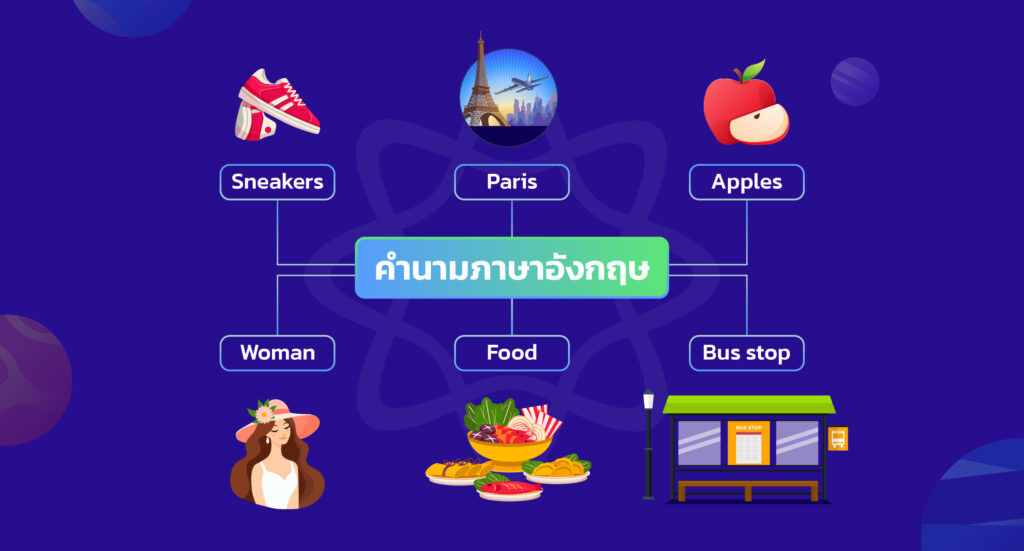
คำสรรพนามภาษาอังกฤษ (pronoun)
บุรุษสรรพนาม:
บุรุษสรรพนามใช้แทนคำนามที่อ้างถึงบุคคล สิ่งของ เหตุการณ์ หรือวัตถุเฉพาะที่กล่าวถึงในประโยคหรืออนุประโยคก่อนหน้าเพื่อหลีกเลี่ยงการซ้ำซ้อน
บุรุษสรรพนามแบ่งออกเป็น 2 กลุ่มตาม 2 บทบาทที่แตกต่างกันในประโยค แต่ละกลุ่มประกอบด้วยคำต่อไปนี้:
บุรุษสรรพนามของประธาน: I/You/They/We/He/She/It.
บุรุษสรรพนามของกรรม: me/you/them/us/him/her/it.
ตัวอย่าง:
My mother is a good doctor at that hospital, she has done many successful surgeries. (แม่ของฉันเป็นหมอที่ดีในโรงพยาบาลนั้น เธอทำการผ่าตัดที่เป็นผลสำเร็จมาหลายครั้ง)
Excuse me, can you give me some snacks right there? (ขอโทษนะ คุณช่วยส่งขนมให้ฉันหน่อยได้ไหม?)
>>> Read more: วิธีใช้ some any อย่างถูกต้อง
สรรพนามเจ้าของ
สรรพนามเจ้าของใช้เพื่อพูดคุยเกี่ยวกับบุคคลหรือวัตถุที่เป็นของใครบางคน กล่าวอีกนัยหนึ่ง นี่เป็นคำสรรพนามที่ใช้เพื่อแสดงการครอบครอง ซึ่งมักใช้เพื่อแทนที่คำนามที่เกี่ยวข้องในประโยคคำสรรพนามแสดงความเป็นเจ้าของทั่วไปในภาษาอังกฤษ ได้แก่:
| สรรพนามเจ้าของ | ความหมาย | ตัวอย่าง |
| Mine | ของฉัน | Her dress is black, mine is pink. (ชุดของเธอสีดำ ส่วนของฉันสีชมพู) |
| Yours | ของเธอ / ของคุณ | I’ve got my pen. Where is yours? (ฉันมีปากกาของฉันแล้ว ปากกาของคุณอยู่ไหน?) |
| Ours | ของพวกเรา | This dress is yours. (ชุดนี้เป็นของพวกเรา) |
| Hers | ของเขา, หล่อน | John got his certificate a year ago but she just got hers 2 months ago. (จอห์นได้รับใบรับรองเมื่อปีที่แล้ว แต่เธอเพิ่งได้รับเมื่อ 2 เดือนที่แล้ว) |
| His | ของเขา (ผู้ชาย) | My car is white, his is blue. (รถของฉันเป็นสีขาว ส่วนรถของเขาเป็นสีน้ำเงิน) |
| Theirs | ของพวกเขา | My notebook looks the same as theirs. (สมุดบันทึกของฉันก็ดูเหมือนกับของพวกเขา) |
| Its | ของมัน | Jane has a lovely cat, this ball is its. (เจนมีแมวน่ารักมาก ลูกบอลนี้คือของมัน) |
สรรพนามสัมพันธ์
สรรพนามสัมพันธ์ใช้เพื่อเชื่อมอนุประโยคที่เกี่ยวข้องเข้าด้วยกันโดยมีวัตถุประสงค์เพื่อเพิ่มข้อมูลเพิ่มเติมให้กับคำนามที่กล่าวไปแล้ว สรรพนามสัมพันธ์ทั่วไปในภาษาอังกฤษ ได้แก่ :
| สรรพนามสัมพันธ์ | ความหมาย | ประเภทคำนามทดแทน | ตัวอย่าง |
| Who | ใคร | อ้างถึงบุคคล | Jane, who is my best friend, is very smart. (เจนซึ่งเป็นเพื่อนที่ดีที่สุดของฉันเป็นคนฉลาดมาก) |
| Whom | ใคร | อ้างถึงบุคคล | The girl whom I walk to the park with is my best friend. (ผู้หญิงที่ฉันเดินไปสวนสาธารณะด้วยเป็นเพื่อนที่ดีที่สุดของฉัน) |
| Which | อันไหน อันซึ่ง | อ้างถึงสิ่งของ | This is Henry’s comic, which he bought 3 years ago. (นี่คือการ์ตูนของ Henry ที่เขาซื้อมาเมื่อ 3 ปีก่อน) |
| Whose | ของใคร | อ้างถึงบุคคลหรือสิ่งของ | The woman whose name is Lona is my English teacher. (ผู้หญิงที่ชื่อโลน่าเป็นครูภาษาอังกฤษของฉัน) |
| That | สิ่งนั้น อันนั้น | อ้างถึงบุคคลหรือสิ่งของ | This is the book that belongs to Jane. (นี่คือหนังสือที่เป็นของเจน) |

สรรพนามคำถาม
สรรพนามคำถามมักจะอยู่หน้าประโยคคำถาม ใช้ถามคำถามที่มีคำตอบเป็นคำนามเฉพาะ คำเหล่านี้ระบุว่าคำถามนี้มุ่งไปที่ใครและอะไรโดยใช้สรรพนามคำถาม 5 คำ: What, Which, Who, Whom, Whose.
ตัวอย่าง:
• What did Henry do when he was in Japan?
ตอนเฮนรี่อยู่ญี่ปุ่นเขาทำอะไร?
• Which sport does she like better, badminton or basketball?
เขาชอบกีฬาประเภทไหนมากกว่ากันแบดมินตัน หรือ บาสเก็ตบอล?
คำคุณศัพท์ภาษาอังกฤษ (adjective)
คำคุณศัพท์ (adjective – adj) มีหน้าที่สนับสนุนคำนามหรือสรรพนาม ช่วยบรรยายลักษณะของสิ่งของหรือปรากฏการณ์ที่คำนามเป็นตัวแทน
คุณศัพท์แสดงความเป็นเจ้าของ
คุณศัพท์แสดงความเป็นเจ้าของเป็นคำคุณศัพท์ประเภทหนึ่งที่บ่งบอกถึงความเป็นเจ้าของของบุคคลในสิ่งที่กล่าวถึง บุรุษสรรพนามแต่ละคำมีคำคุณศัพท์แสดงความเป็นเจ้าของที่สอดคล้องกันดังนี้:
| บุรุษสรรพนาม | คุณศัพท์แสดงความเป็นเจ้าของ | ความหมาย |
| I | My | ของฉัน |
| You | Your | ของคุณ |
| We | Our | ของเรา |
| They | Their | ของพวกเขา |
| He | His | ของเขา (ผู้ชาย) |
| She | Her | ของเขา (ผู้หญิง) |
| It | Its | ของมัน |
คำคุณศัพท์ที่ลงท้ายด้วย “ing” และ “ed”:
คำคุณศัพท์ที่ลงท้ายด้วย “ing” และ “ed” เป็นคำคุณศัพท์ที่เกิดจากคำกริยาที่เติมคำต่อท้าย “ing” หรือ “ed” ใช้เพื่ออธิบายคุณสมบัติ ลักษณะ อารมณ์ ความรู้สึกของบุคคล สิ่งของ หรือเหตุการณ์
- คำคุณศัพท์ที่ลงท้ายด้วย “ing”: บรรยายลักษณะและคุณสมบัติของบุคคล/สิ่งของ/เหตุการณ์ที่มีผลกระทบต่อบุคคลหรือสิ่งของอื่น
- คำคุณศัพท์ที่ลงท้ายด้วย “ed”: บรรยายว่าบางคนรู้สึกอย่างไรเมื่อได้รับผลกระทบจากบุคคล/สิ่งของบางอย่าง
ตัวอย่าง:
• This old game is boring.
เกมเก่านี้มันน่าเบื่อ
• My mother is surprised that my sister can repair her toy.
แม่ของฉันแปลกใจที่น้องสาวของฉันสามารถซ่อมของเล่นของเธอได้

คำกริยาภาษาอังกฤษ (verb)
กริยาไม่ปกติ
กริยาไม่ปกติ (irregular verbs) เป็นคำกริยาที่ไม่เป็นไปตามกฎการผันคำกริยาตามปกติ (เติม “ed”) เมื่อเปลี่ยนเป็นรูปอดีตหรือกริยาในอดีต เนื่องจากลักษณะนี้ คุณจะต้องจำตารางกริยาไม่ปกติเพื่อให้สามารถนำไปใช้ได้อย่างง่ายดายและได้ผลการสอบที่ดีขึ้น
ตัวอย่างกริยาไม่ปกติในภาษาอังกฤษ:
| V | V2 | V3 | ความหมาย |
| begin | began | begun | เริ่ม |
| bid | bid | bid | กล่าวคำ คำสั่ง |
| bring | brought | brought | พา นำ |
กริยาช่วย:
กริยาช่วยเป็นคำกริยาที่รวมกับกริยาหลักในประโยคเพื่อแสดงการอนุญาตหรือความสามารถที่จะทำสิ่งใด ๆ ในอดีต ปัจจุบัน หรืออนาคต กริยาที่ตามหลังกริยาช่วยจะอยู่ในรูปต้นฉบับเสมอ
กริยาช่วยพื้นฐานในภาษาอังกฤษ:
| กริยาช่วย | ความหมาย | ตัวอย่าง |
| Can/ Could/ Be able to | สามารถ / ได้ | Jane can play badminton every Saturday. (ทุกวันเสาร์เจนสามารถเล่นแบดมินตันได้) |
| Must/ Have to | ต้องการ / ต้อง | John has been studying all day, he must be tired. (จอห์นเรียนหนังสือมาทั้งวัน เขาคงจะเหนื่อยมากแน่ๆ) |
| May/ Might | สามารถ / ได้ | It may be cold. (มันอาจจะหนาวได้) |
| Will/ Would/ Shall | จะ | John will win this easy game. (จอห์นจะชนะเกมง่ายๆ นี้) |
| Should/ Ought to | ควร | You ought to lock all the doors carefully. (คุณควรล็อคประตูทั้งหมดอย่างระมัดระวัง) |
กริยา “to be”
กริยา to be รวมถึง: be are am is was were been และ being มีหน้าที่เสริมกริยาหลักในประโยค
ตัวอย่าง:
This beautiful house was built in 2000.
บ้านที่สวยงามหลังนี้สร้างขึ้นเมื่อปี พ.ศ.2543
กริยานุเคราะห์
กริยานุเคราะห์รวมถึง be have do can will shall may must used (to) need ought (to) dare มีหน้าที่แสดงความตึงเครียดของการกระทำหรือสร้างคำถาม ประโยคปฏิเสธ และ Cleft Sentences
ตัวอย่าง:
Henry does his housework well.
เฮนรี่ทำการบ้านของเขาได้ดี
I had to walk to the school because I woke up late.
ฉันต้องเดินไปโรงเรียนเพราะฉันตื่นสาย
กริยาวลี:
กริยาวลีเกิดจากการรวมกันของคำกริยากับคำวิเศษณ์หรือคำบุพบทบางคำ ทำให้เกิดเป็นวลีที่มีความหมายชัดเจน
ตัวอย่าง:
You shouldn’t big Jane up like that.
คุณไม่ควรยกย่องเจนแบบนั้น
Don’t bank on Henry to do that.
อย่าหวังว่าเฮนรี่จะทำแบบนั้น
อกรรมกริยาและสกรรมกริยา
กิริยาที่ไม่ต้องมีกรรมมารองรับ เป็นกริยาที่ไม่มีเจตนา และเกิดขึ้นเองโดยไม่มีผู้กระทำ
ตัวอย่าง:
I asked to take a rest and she agreed.
ฉันขอพักผ่อนและเธอก็ตอบตกลง
สกรรมกริยาคือกริยาที่ต้องมีกรรมมารองรับ เป็นกริยาที่มีเจตนาและมีผู้กระทำกริยา
ตัวอย่าง:
He owed Jane a lot of money.
เขาเป็นหนี้เจนเป็นจำนวนมาก
กริยาเชื่อม
กริยาเชื่อมใช้เชื่อมประธานและคำคุณศัพท์ภาคแสดงเพื่อแสดงสถานะของประธานในประโยค
กริยาเชื่อมทั่วไป:
| กริยาเชื่อม | ความหมาย | ตัวอย่าง |
| be | คือ เป็น | Why should Jane be unhappy? (ทำไมเจนถึงต้องไม่มีความสุข?) |
| feel | รู้สึก | Jane feels hungry after she walks home from school. (เจนรู้สึกหิวหลังจากเดินกลับบ้านจากโรงเรียน) |
| look | ดู | My sister looks tired. (น้องสาวฉันดูเหนื่อยมาก) |
| sound | ฟังดู | They sounded more confident than they felt. (พวกเขาฟังดูมั่นใจมากกว่าที่พวกเขารู้สึก) |
| smell | กลิ่น | This dish smells good. (เมนูจานนี้กลิ่นหอมดี) |
| taste | มีรสชาติ | The biscuit tastes sweet. (บิสกิตมีรสชาติหวาน) |
| appear | ปรากฏว่า | Henry appeared very confident. (เฮนรี่ดูมั่นใจมาก) |
| seem | ดูเหมือน | Jane seems happy. (เจนดูมีความสุข) |
| remain | ยังคง | We remained good friends. (พวกเรายังคงเป็นเพื่อนที่ดีต่อกัน) |
| stay | อยู่ | She never stays unhappy for long. (เธอไม่เคยอยู่กับความทุกข์เป็นเวลายาวนาน) |
คำกริยาวิเศษณ์ภาษาอังกฤษ (adverb)
คำกิริยาวิเศษณ์ในไวยากรณ์ภาษาอังกฤษคือคำที่เพิ่มข้อมูลเกี่ยวกับคุณสมบัติ สถานการณ์ และลักษณะเฉพาะให้กับคำอื่นๆ คำวิเศษณ์เข้าใจง่ายเพื่ออธิบายเนื้อหา “อย่างไร เมื่อไร ที่ไหน และขอบเขตเท่าใด” ของการกระทำ
| จำแนกประเภท | คำจำกัดความ | คำกิริยาวิเศษณ์ทั่วไปบางคำ | ตัวอย่าง |
| สถานวิเศษณ์ | สถานวิเศษณ์ใช้เพื่ออธิบายสถานที่ที่การกระทำเกิดขึ้นหรืออธิบายระยะทางในแง่ทั่วไป | there (ที่นั่น), somewhere (บางแห่ง), inside (ข้างใน), outside (ข้างนอก) | Jane is cooking downstairs. เจนกำลังทำอาหารอยู่ข้างล่าง Standing between two trees was a small kid.ยืนอยู่ระหว่างต้นไม้สองต้นที่มีเด็กเล็กคนหนึ่ง |
| กริยาวิเศษณ์บอกระดับ | กริยาวิเศษณ์บอกระดับ ใช้เพื่ออธิบายระดับของการเกิดขึ้นของการกระทำหรือเหตุการณ์บางอย่างในประโยค คำวิเศษณ์ระดับมักจะอยู่หน้าคำคุณศัพท์ กริยา หรือคำวิเศษณ์ที่คำวิเศษณ์นั้นปรับเปลี่ยน | hardly (เกือบจะไม่), little (น้อย), fully (อย่างเต็มที่), very (มาก) | I can hardly say that I was very happy.ฉันแทบจะพูดไม่ได้เลยว่าฉันมีความสุขมาก They were fully present.พวกเขาอยู่ครบทุกคน |
| กริยาวิเศษณ์บอกเวลา | กริยาวิเศษณ์บอกเวลา ระยะเวลา และความถี่ของการกระทำหรือเหตุการณ์บางอย่าง | early (เช้า), now (ตอนนี้), soon (ในไม่ช้า), finally (ในที่สุด),… | I went to Dubai with my family last year.ฉันไปดูไบกับครอบครัวเมื่อปีที่แล้ว Everyday, my sister plays badminton.น้องสาวของฉันเล่นแบดมินตันทุกวัน |
| กริยาวิเศษณ์บอกลักษณะอาการ | กริยาวิเศษณ์บอกลักษณะอาการใช้เพื่ออธิบายวิธีการหรือวิธีการที่การกระทำเกิดขึ้น กล่าวอีกนัยหนึ่ง คำวิเศษณ์แสดงลักษณะจะช่วยคุณตอบคำถาม “How?” | My sister is noisily chewing the food.น้องสาวของฉันกำลังเคี้ยวอาหารเสียงดัง Unfortunately, Henry missed the train.น่าเสียดายที่เฮนรี่พลาดรถไฟ | |
| กริยาวิเศษบอกความถี่ | กริยาวิเศษบอกความถี่ใช้เพื่อแสดงความถี่ของการเกิดขึ้นและการทำซ้ำของการกระทำในประโยค | always (ตลอดเวลา), usually (มักจะ), sometimes (บางครั้ง), rarely (ไม่บ่อย ไม่ค่อยมี), never (ไม่เคย),… | Jane always goes to school on time. เจนมาโรงเรียนตรงเวลาเสมอ My sister is on a diet, she rarely eats dinner. น้องสาวของฉันกำลังลดน้ำหนัก เธอจึงแทบจะไม่ได้ทานมื้อเย็นเลย |
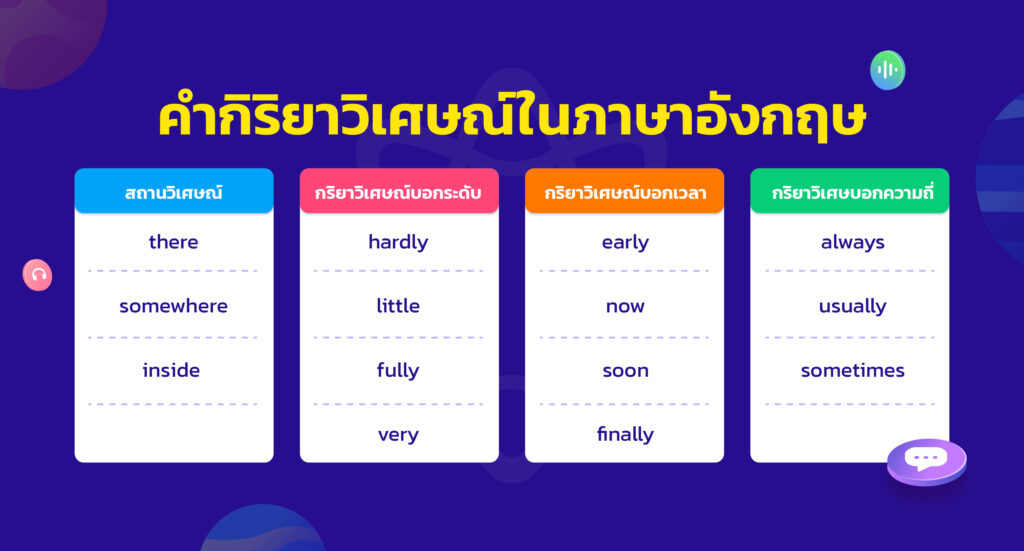
คำบอกปริมาณภาษาอังกฤษ (quantifier)
| จำแนกประเภท | คำจำกัดความและวิธีการใช้ | โครงสร้าง | ตัวอย่าง |
| “Few”, “a few”, “little”, “a little” | “Few” และ “a few” อยู่หน้าคำนามนับได้พหูพจน์ ในขณะเดียวกัน “little” และ “a little” อยู่หน้าคำนามนับได้เอกพจน์ “Few”, “little” หมายถึง “น้อย” และมีความหมายเชิงลบ (แทบไม่มีเลย)“A few”, “a little” หมายถึง “ไม่กี่” และมีความหมายเชิงบวก | Few/ A little + คำนามนับได้ (พหูพจน์) + V (พหูพจน์) Little/ A little + คำนามนับไม่ได้ + V (เอกพจน์) | A few are middle school students.มีไม่กี่คนที่เป็นนักเรียนมัธยมต้น I have few friends, but all of them are so great.ฉันมีเพื่อนไม่กี่คน แต่ทุกคนก็ดีมาก I have a little homework that needs to be done before night. ฉันมีการบ้านเล็กน้อย ที่ต้องทำก่อนคืนนี้ She has little water.เธอมีน้ำนิดหย่อย |
| “Some” และ “any” | “Some” หมายความว่า “จำนวนไม่กี่” มักใช้ในประโยคบอกเล่า สามารถอยู่หน้าคำนามนับได้ (พหูพจน์) หรือคำนามนับไม่ได้“Any” ใช้ในประโยคปฏิเสธและประโยคคำถามเป็นหลัก สามารถอยู่หน้าคำนามนับได้ (พหูพจน์) หรือคำนามนับไม่ได้ | Some + คำนามนับได้ (พหูพจน์) + กริยา (พหูพจน์) Some + คำนามนับไม่ได้ + กริยา (เอกพจน์)Any + คำนาม (พหูพจน์นับได้) + กริยา (พหูพจน์) Any + คำนาม (นับไม่ได้) + กริยา (เอกพจน์) | Henry bought some pencils. เฮนรี่ซื้อดินสอมา There are not any tomatoes in the kitchen. ในครัวไม่มีมะเขือเทศเลย |
| “Much” และ “many” | “Much” และ “many” หมายถึง “มากหรือกี่” สามารถใช้ได้ทั้งในประโยคบอกเล่า ประโยคปฏิเสธ และประโยคคำถาม ในส่วนของประเภทของคำนามที่ตามหลัง คำว่า “much” และ “many” จะใช้ดังนี้: Much: ใช้กับคำนามนับไม่ได้Many: ใช้กับคำนามนับได้พหูพจน์ | Many (of) + คำนามนับได้ (พหูพจน์) Much (of) + คำนามนับไม่ได้ | Many of my friends like playing badminton. เพื่อนของฉันหลายคนชอบเล่นแบดมินตัน How much time does she have left?เธอยังมีเวลาเหลืออยู่เท่าไร? |
| คุณเคยสงสัยไหมว่า much และ many ใช้ต่างกันอย่างไรในประโยคคำถาม? มาลองเรียนรู้วิธีใช้ how much how many พร้อมตัวอย่างประโยคจริง ๆ ในบทความนี้กันเลย รับรองเข้าใจง่ายและใช้ได้จริงทุกสถานการณ์ |
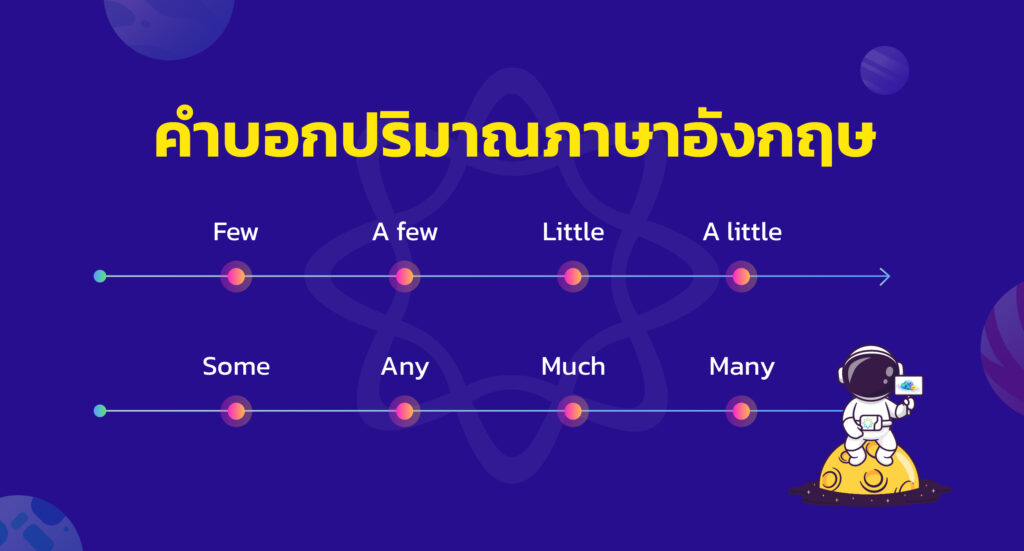
คำบุพบทภาษาอังกฤษ (preposition)
คำบุพบทคือคำหรือวลีที่แสดงความสัมพันธ์ระหว่างคำนามตั้งแต่ 2 คำขึ้นไปในประโยค คำบุพบทโดยปกติจะอยู่ข้างหน้าคำนามหรือคำสรรพนาม แต่ยังสามารถยืนในตำแหน่งต่างๆ มากมายในประโยค ขึ้นอยู่กับวัตถุประสงค์ของการใช้ ด้านล่างนี้เป็นคำบุพบทพื้นฐาน 3 ประเภทในภาษาอังกฤษ:
| จำแนกประเภท | คำจำกัดความ | คำทั่วไป | ตัวอย่าง |
| คำบุพบทบ่งบอกตำแหน่ง | คำบุพบทบ่งบอกตำแหน่งมีหน้าที่ชี้แจงข้อมูลเกี่ยวกับสถานที่หรือตำแหน่งที่กล่าวถึงในประโยค | in (ข้างใน), on (บน), at (ที่), under (ข้างล่าง ใต้),… | Jane is in her room. เจนอยู่ในห้องของเธอ She put her pen under the desk. เธอวางปากกาของเธอไว้ใต้โต๊ะ |
| คำบุพบทบ่งบอกเวลา | คำบุพบทบ่งบอกเวลามีหน้าที่ชี้แจงข้อมูลเกี่ยวกับเวลาของเหตุการณ์หรือการกระทำที่กล่าวถึงในประโยค | in on at | Jane and Mary will go to the park in the evening. เจนและแมรี่จะไปสวนสาธารณะในตอนเย็น They will meet at 9 p.m. พวกเขาจะพบกัน ณ เวลา 21.00 น. |
| คำบุพบทประเภทอื่นๆ | คำบุพบทที่บ่งบอกทิศทาง: to (ถึง), along (ร่วมด้วย), cross (ข้าม), up (ขึ้น), from (จาก),… คำบุพบทเป็นตัวแทน: by (โดย), with (กับ ด้วย) คำบุพบทหมายถึงอุปกรณ์และเครื่องจักร: by (โดย), with (กับ ด้วย), on (บน) คำบุพบทแสดงสาเหตุและวัตถุประสงค์: for (ให้), through (ผ่าน), because of (เพราะ), on account of (เนื่องจาก), from (จาก) | She is going to the store. เธอกำลังจะไปร้านค้า They walked along the river. พวกเขาเดินไปตามริมแม่น้ำ |
คำนำหน้าคำนามภาษาอังกฤษ (article)
คำนำหน้าคำนามเป็นองค์ประกอบที่นำหน้าและแก้ไขคำนาม ซึ่งบ่งชี้ว่าคำนามที่แก้ไขนั้นเป็นวัตถุที่แน่นอนหรือไม่มีกำหนด คำนำหน้าคำนามในภาษาอังกฤษมีดังนี้ a, an และ the มาดู a an the ใช้ยังไง กับ ELSA Speak ทันที
คำนำหน้าคำนาม “the” ใช้เมื่อคุณต้องการอ้างถึงวัตถุหรือสิ่งของบางอย่างที่ได้รับการระบุ (ทั้งผู้พูดและผู้ฟังเข้าใจ)
คำนำหน้าคำนาม “a” หรือ “an” ใช้เพื่ออ้างถึงวัตถุทั่วไปที่ไม่ได้กำหนด
ตัวอย่าง
- The sun is very bright today. (วันนี้แดดแรงมาก)
- I saw a dog in the park. (ฉันเห็นสุนัขในสวนสาธารณะ)
- She is eating an apple. (เธอกำลังกินแอปเปิ้ล)
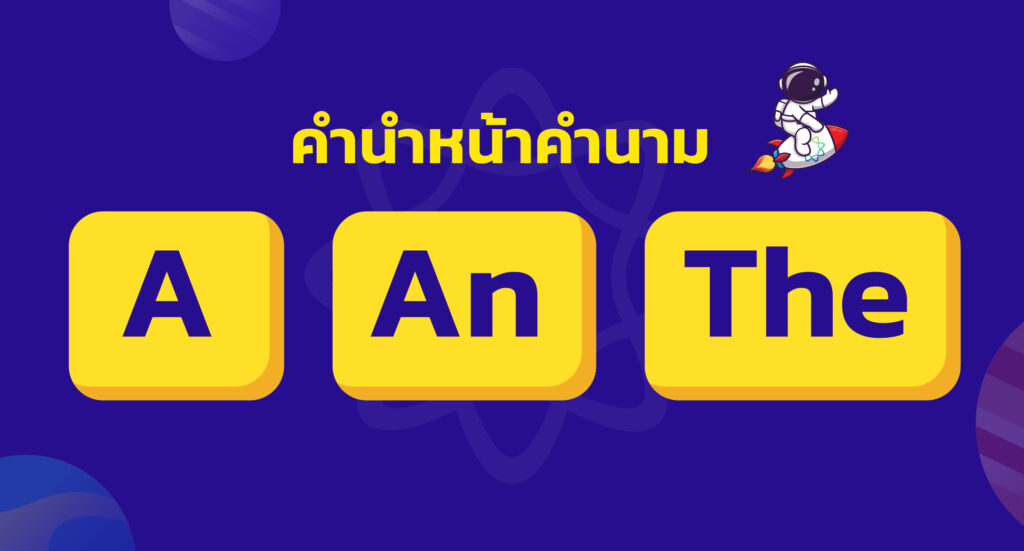
คำสันธานภาษาอังกฤษ (conjunction)
คำสันธานเป็นคำประเภทหนึ่งที่ใช้เชื่อมประโยค วลี หรือย่อหน้า ตามการจำแนกประเภทการใช้งาน ประเภทของคำสันธานแบ่งออกได้ดังนี้:
| จำแนกประเภท | คำจำกัดความ | คำทั่วไป | ตัวอย่าง |
| Subordinating Conjunctions | Subordinating Conjunctions เป็นคำร่วมชนิดหนึ่งที่ใช้เชื่อมระหว่างประโยคหลักและประโยคที่ขึ้นอยู่ด้วยกัน (ประโยคที่ขึ้นอยู่กับคือกลุ่มคำที่ประกอบด้วย ประธานและ กริยา ใช้แก้ไขประโยคแต่ไม่ได้มีความหมายสมบูรณ์ในตัวเอง) | because – since – as (เพราะ – ตั้งแต่ – เหมือน); as long as (ตราบเท่าที่); before (ก่อนที่), after (หลังจาก); although (แม้ว่า),… | Although Henry had a broken leg, he still passed the final exam.แม้ว่าเฮนรี่จะขาหัก แต่เขาก็ยังไปสอบปลายภาคได้ |
| Coordinating Conjunctions | Coordinating Conjunctions ในไวยากรณ์ภาษาอังกฤษ ใช้เพื่อเชื่อมหน่วยที่เทียบเท่ากัน 2 หน่วย (หรือมากกว่า) (คำ วลี อนุประโยค ฯลฯ) | for (ให้), and (และ), nor (และก็ไม่เหมือนกัน), but (แต่), or (หรือ), yet (ยัง ยังคง), so (ดังนั้น). | I want to play badminton and handball. ฉันอยากเล่นแบดมินตันและแฮนด์บอล |
| Correlative Conjunctions | Correlative Conjunctions ใช้เพื่อเชื่อมหน่วยคำที่เทียบเท่ากันสองหน่วย การเชื่อมประเภทนี้จะต้องมาเป็นคู่เสมอและไม่สามารถแยกออกจากกันได้ | neither – nor (ไม่… ก็ไม่); not only – but also (ไม่เพียงแค่ (แต่) … แต่ก็ยัง…); either – or (ไม่…ก็…); both – and (ทั้ง…และ… );… | We play badminton not only on Tuesday but also on Sunday. เราเล่นแบดมินตันไม่เพียงแต่วันอังคารเท่านั้น แต่ยังรวมถึงวันอาทิตย์ด้วย |
| การเรียนรู้เรื่อง conjunction อย่างละเอียดในบทความนี้ จะช่วยให้คุณแยกแยะรูปแบบต่าง ๆ ของคําเชื่อมภาษาอังกฤษได้ พร้อมมีแบบฝึกหัดเพิ่มเติมเพื่อพัฒนาทักษะภาษาอังกฤษของคุณ ไปเรียนรู้กันเลย |
ไวยากรณ์ภาษาอังกฤษเกี่ยวกับโครงสร้างประโยค
โครงสร้างประโยคเปรียบเทียบ
| จำแนกประเภท | วิธีใช้ | โครงสร้าง | ตัวอย่าง |
| การเปรียบเทียบเท่ากัน | โครงสร้างการเปรียบเทียบเท่ากันใช้เพื่อเปรียบเทียบคน สิ่งของ หรือเหตุการณ์ที่คล้ายคลึงกัน | S + to be/ V + (not) as + adj/ adv + as + O. adj: คำคุณศัพท์ adv: คำวิเศษณ์ O: กรรม | My house is as large as Henry’s house. (บ้านของฉันใหญ่เท่ากับบ้านของเฮนรี่) |
| การเปรียบเทียบขั้นกว่า | โครงสร้างการเปรียบเทียบขั้นกว่าใช้เพื่อแสดงความแตกต่างตามเกณฑ์บางประการของบางสิ่ง เหตุการณ์ หรือบุคคลโครงสร้างการเปรียบเทียบขั้นกว่าแบ่งออกเป็น 2 โครงสร้างตามประเภทของคำคุณศัพท์/คำวิเศษณ์ที่ใช้ในประโยค คือ สั้นหรือยาว คำคุณศัพท์/คำวิเศษณ์สั้น คือ คำคุณศัพท์/คำวิเศษณ์ที่มี 1 พยางค์เมื่อออกเสียงเท่านั้น หรือคำคุณศัพท์/คำวิเศษณ์ที่มี 2 พยางค์ แต่ลงท้ายด้วย –y, –le, –er, –ow và –et. คำคุณศัพท์/คำวิเศษณ์ยาว คือ คำคุณศัพท์/คำวิเศษณ์ที่มี 2 พยางค์ขึ้นไปเมื่อออกเสียง | โครงสร้างเปรียบเทียบขั้นกว่ากับคำคุณศัพท์/คำวิเศษณ์ที่มี 1 พยางค์: S + V + Adj/ Adv + er + than + O/ Clause/ N/ Pronoun Clause: อนุประโยค N: คำนาม Pronoun: คำสรรพนาม โครงสร้างเปรียบเทียบขั้นกว่ากับคำคุณศัพท์/กริยาวิเศษณ์ตั้งแต่ 2 พยางค์ขึ้นไป: S + V + more + Adj/ Adv + than + O/ Clause/ N/ Pronoun | Jane studied harder than she did before. (เจนตั้งใจเรียนมากขึ้นกว่าเมื่อก่อน) This season is more interesting than season 1. (ซีซั่นนี้มันน่าสนใจกว่าซีซั่น 1 นะ) |
| การเปรียบเทียบขั้นสุด | การเปรียบเทียบขั้นสุดใช้เพื่อระบุบุคคล สิ่งของ หรือเหตุการณ์ที่โดดเด่นที่สุดด้วยเกณฑ์บางอย่าง การเปรียบเทียบขั้นสุดเกิดขึ้นในกลุ่มที่มีวัตถุอย่างน้อย 3 ชิ้นขึ้นไป | โครงสร้างคำคุณศัพท์/กริยาวิเศษณ์สั้น: S + V + the + Adj/ Adv -est โครงสร้างที่มีคำคุณศัพท์/กริยาวิเศษณ์ยาว: S + V + the + most + Adj/Adv | Henry is the tallest in my class. (เฮนรี่เป็นคนที่สูงที่สุดในชั้นเรียนของฉัน) This dress is the most expensive of all. (ชุดนี้ถือว่ามีราคาแพงที่สุด) |
โครงสร้างประโยคเงื่อนไข
| จำแนกประเภท | วิธีใช้ | โครงสร้าง | ตัวอย่าง |
| ประโยคเงื่อนไขแบบที่ 0 | ประโยคเงื่อนไขแบบที่ 0 อธิบายนิสัย การกระทำที่เกิดขึ้นเป็นประจำหากตรงตามเงื่อนไขบางประการ นอกจากนี้ โครงสร้างนี้ยังใช้เพื่อแสดงความจริงที่ชัดเจนหรือผลลัพธ์ที่หลีกเลี่ยงไม่ได้ที่เกิดขึ้นภายใต้เงื่อนไขบางประการ | If + S + V(s, es), S + V(s, es) | I usually go to the park on weekends if the weather is good. (ฉันมักจะไปสวนสาธารณะในช่วงสุดสัปดาห์ถ้าอากาศดี) |
| ประโยคเงื่อนไขแบบที่ 1 | ประโยคเงื่อนไขแบบที่ 1 ใช้เพื่ออธิบายสภาวะและผลลัพธ์ที่อาจเกิดขึ้นในปัจจุบันหรืออนาคต | If + S + V(s, es), S + can/ will/ may (not) + V-inf | You will feel energetic the next day if you go to bed early today. (หากวันนี้คุณเข้านอนเร็ว คุณจะรู้สึกกระปรี้กระเปร่าในวันรุ่งขึ้น) |
| ประโยคเงื่อนไขแบบที่ 2 | ประโยคเงื่อนไขแบบที่ 2 ใช้เพื่ออ้างถึงเงื่อนไขและผลลัพธ์ที่ไม่มีอยู่จริงในปัจจุบันหรือไม่น่าจะเกิดขึ้นในอนาคต | If + S + V-ed/ were (not), S + would/ could/ should (not) + V-inf | Jane could buy this laptop if she had more money. (เจนอาจซื้อแล็ปท็อปเครื่องนี้ได้หากเธอมีเงินมากกว่านี้) |
| ประโยคเงื่อนไขแบบที่ 3 | ประโยคเงื่อนไขแบบที่ 3 เคยพูดถึงสภาวะที่ไม่จริงและส่งผลถึงอดีต | If + S + had + Vpp, S + would/ could/ should + have + Ved/II | If Jane had studied harder, she would have passed the final exam. (ถ้าเจนตั้งใจเรียนมากกว่านี้ เธอก็คงจะสอบผ่านแล้ว) |
ประโยคเงื่อนไขแบบผสม
ประโยคเงื่อนไขแบบผสมคือการรวมกันของประโยคเงื่อนไขประเภท 2 และประเภท 3 ทั้งสองประโยคประเภทนี้แบ่งออกเป็น 2 กรณีดังนี้
| กรณี | โครงสร้าง | ตัวอย่าง |
| If 2 main 3 (เคยพูดถึงผลที่จะเกิดขึ้นในอดีตหากสภาวะปัจจุบันดังกล่าวเป็นจริง) | If + S + Ved/ were (not), S + would/ could/ should + have + VII | If I were Jane, I would have accepted this invitation. (ถ้าฉันเป็นเจน ฉันคงจะตอบรับคำเชิญนี้) |
| If 3 main 2 (เคยพูดถึงผลที่จะเกิดขึ้นในปัจจุบันหากเงื่อนไขในอดีตเป็นจริง) | lf +S + had + VII, S + would/ could/ should (not) + V-inf | If I had accepted that invitation, I would be at the party now. (ถ้าฉันตอบรับคำเชิญนั้น ฉันจะไปงานปาร์ตี้ตอนนี้) |
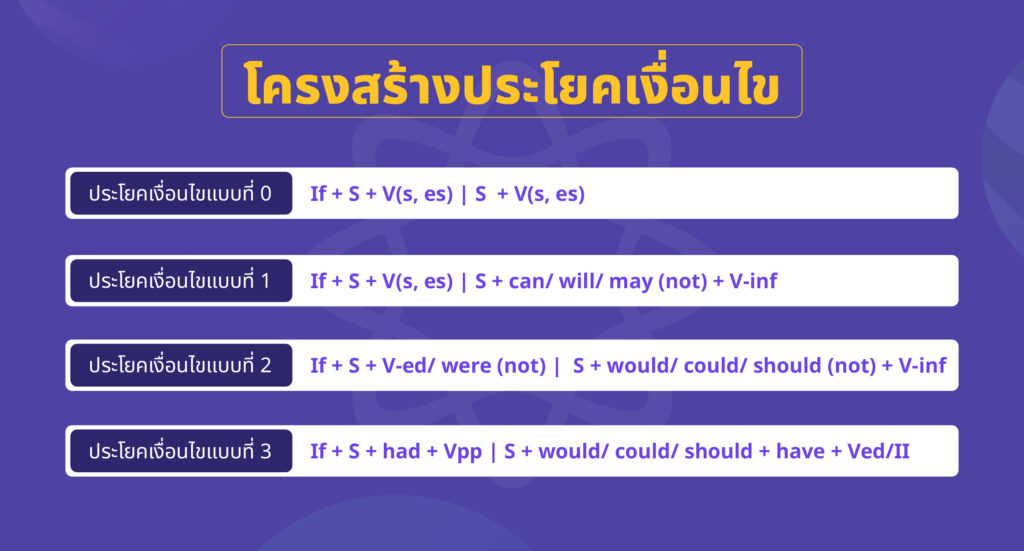
โครงสร้างประโยคแสดงความปรารถนา
โครงสร้าง “wish” ใช้เพื่อแสดงความปรารถนาหรือความฝันของผู้พูดในเรื่องหรือเหตุการณ์บางอย่าง ความปรารถนานี้สามารถเกิดขึ้นได้ทั้งสามเวลา: ปัจจุบัน อดีต และอนาคต – เทียบเท่ากับกาล 3 ในภาษาอังกฤษ โครงสร้าง “wish” จึงมีการใช้งานเฉพาะดังนี้
| โครงสร้าง “wish” | โครงสร้าง | ตัวอย่าง |
| โครงสร้าง “wish” ในปัจจุบัน | S + wish(es) + (that) + S + V-edS + wish(es) + (that) + S + not + V-ed | My brother wishes he had a big house. (พี่ชายของฉันอยากมีบ้านใหญ่ๆ) |
| โครงสร้าง “wish” ในอนาคต | S1 + wish(es) + S2 + could/ would + V | John wishes we could attend his birthday party next week. (จอห์นหวังว่าเราจะไปร่วมงานวันเกิดของเขาในสัปดาห์หน้าได้) |
| โครงสร้าง “wish” ใน อดีต | S1 + wish(es) + S2 + had + Vpp | Jane wishes that she had studied harder. (เจนหวังว่าเธอจะตั้งใจเรียนหนักขึ้น) |
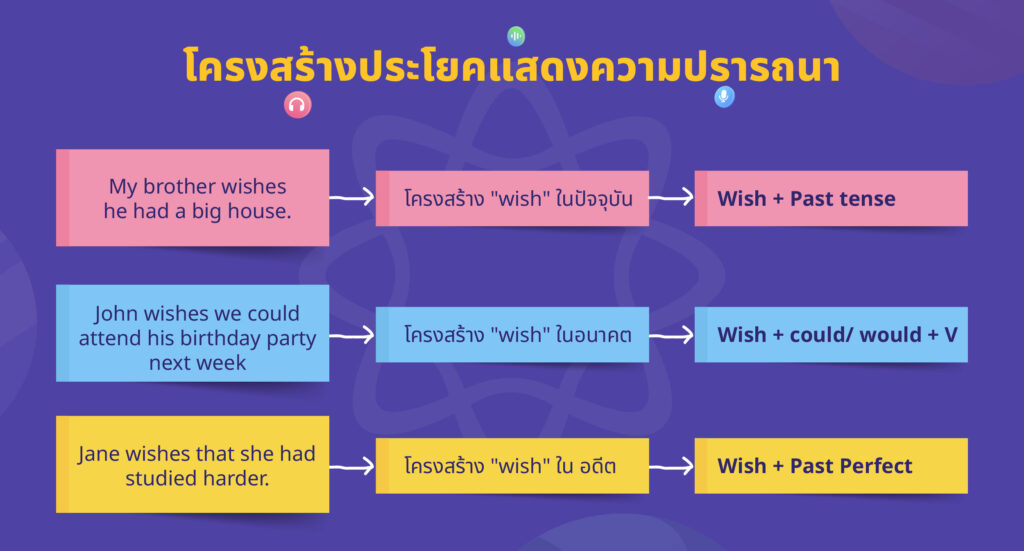
โครงสร้างประโยคที่ประธานเป็นผู้ถูกกระทำ/ ประโยคที่ประธานเป็นผู้กระทำ
โครงสร้างประโยคที่ประธานเป็นผู้ถูกกระทำเป็นโครงสร้างประโยคที่ใช้เน้นเรื่องที่ได้รับผลกระทบแทนที่จะเน้นไปที่ประธาน สูตรการแปลงจากประโยคที่ประธานเป็นผู้กระทำเป็นโครงสร้างประโยคที่ประธานเป็นผู้ถูกกระทำสรุปได้ในตารางต่อไปนี้:
| กาล | โครงสร้างประโยคที่ประธานเป็นผู้กระทำ | โครงสร้างประโยคที่ประธานเป็นผู้ถูกกระทำ | ตัวอย่าง |
| Present Simple Tense | S + V(s/ es) + O | O + am/ are/ is + (by + Subject) | The letter is written by her. (จดหมายนี้ถูกเขียนโดยเธอ) |
| Present Continuous Tense | S + am/is/are + Ving + O | O + am/ are/ is + being + P2 (by + Subject) | The house is being painted by the workers right now. (ขณะนี้บ้านกำลังถูกคนงานทาสีอยู่) |
| Present Perfect Tense | S + have/has + P2 + O | O + have/ has + been + P2 (by + Subject) | The project has been completed by the team on time. (ทีมงานได้ดำเนินโครงการเสร็จทันเวลา) |
| Past Simple Tense | S + Ved + O | O + was/ were + P2 (by + Subject) | The song was performed by the band at last night’s concert. (เพลงนี้วงดนตรีได้แสดงบนเวทีคอนเสิร์ตเมื่อคืนนี้) |
| Past Continuous Tense | S + was/ were + Ving + O | O + was/ were + being + P2 (by + Subject) | The dinner was being prepared by the chef when the guests arrived. (เชฟกำลังเตรียมอาหารเย็นเมื่อแขกมาถึง) |
| Past Perfect Tense | S + had + P2 + O | O + had + been + P2 (by + Subject) | The report had been submitted by her before the deadline. (เธอได้ส่งรายงานก่อนถึงกำหนดเวลา) |
| Future Simple Tense | S + will + V + O | O + will + be + V (by + Subject) | The new bridge will be built by the construction company next year. (สะพานใหม่จะสร้างขึ้นโดยบริษัทก่อสร้างในปีหน้า) |
| Future Perfect Tense | S + will have + P2 + O | O+ will have + been + P2 (by + Subject) | The stadium will have been renovated by the time the season starts. (สนามกีฬาจะได้รับการปรับปรุงให้เสร็จเรียบร้อยก่อนเริ่มฤดูกาล) |

เข้าใจและใช้ Tense อย่างถูกต้องและคล่องแคล่ว
12 tense ในภาษาอังกฤษ: โครงสร้าง หลักการใช้ และสัญญาณการรับรู้
ประโยคที่บอกความต้องการในภาษาอังกฤษ
ประโยคที่บอกความต้องการ (Subjunctive) ใช้เพื่อแสดงการคาดเดาและความปรารถนาให้ใครสักคนทำอะไรให้คุณ ประโยคที่บอกความต้องการเป็นเพียงความจำเป็นเท่านั้น และไม่ได้แสดงถึงการบีบบังคับเหมือนประโยคคำสั่ง
โครงสร้าง:
โครงสร้างประโยคที่บอกความต้องการกับคำกริยา
| S1 + V1 + that + S2 + V2 + O … |
ในโครงสร้างประโยคที่บอกความต้องการ V1 เป็นคำกริยาที่บอกความต้องการที่ผันตามกาลของประธาน S1 V2 เป็นคำกริยาที่อยู่ในรูป infinitive เสมอ
ด้านล่างนี้คือคำกริยาที่บอกความต้องการ (V1) ที่ใช้กันทั่วไปก่อน “that”:
| คำกริยา (V1) | ความหมาย |
| advise | แนะนำ เตือน |
| demand | ต้องการ อุปสงค์ |
| prefer | ชอบมากกว่า |
| require | ต้องการ ประสงค์ |
| insist | ยืนยัน ยืนหยัด |
| propose | เสนอ |
| stipulate | ระบุ กำหนด |
| decree | บัญชา สั่ง |
| order | สั่ง |
| request | ขอร้อง เรียกร้อง |
| urge | กระตุ้น คะยั้นคะยอ |
| ask | ขอ |
| command | บัญชา สั่ง สั่งการ |
| recommend | แนะนำ ชี้แนะ เสนอแนะ |
| suggest | แนะนำ เสนอ เสนอแนะ |
ตัวอย่าง:
I propose that we discuss this at the next meeting. (ฉันเสนอให้เราหารือเรื่องนี้กันในการประชุมครั้งต่อไป)
He commanded that man go at once. (พระองค์ทรงบัญชาให้ชายคนนั้นไปทันที)
โครงสร้างประโยคที่บอกความต้องการกับคุณศัพท์
| It + to be + adj + that + S + V-inf |
ในโครงสร้างประโยคที่บอกความต้องการนี้ กิริยา to be จะแบ่งตามกาลของประโยค V จะถูกคงไว้ในรูปแบบเดิมเสมอ
ด้านล่างนี้คือคำกริยาที่บอกความต้องการที่ใช้กันทั่วไปกับคุณศัพท์
| คำกริยา | ความหมาย |
| important | สำคัญ |
| necessary | จำเป็น |
| obligatory | บังคับ |
| essential | จำเป็น |
| recommended | แนะนำ |
| mandatory | บังคับ |
| advisable | ซึ่งแนะนำได้ |
| required | ต้องการ |
| vital | จำเป็นที่สุด สำคัญแก่ชีวิต |
| suggested | แนะนำ |
| proposed | เสนอ |
| imperative | ซึ่งเลี่ยงไม่ได้ จำเป็น |
| crucial | เด็ดขาด สำคัญมาก |
ตัวอย่าง:
It is recommended that you should consult your doctor. (ขอแนะนำให้คุณควรปรึกษาแพทย์ของคุณ)
It is essential that we present a united front .( สิ่งสำคัญคือเราต้องนำเสนอแนวร่วมที่เป็นหนึ่งเดียวกัน)
โครงสร้างประโยคที่บอกความต้องการกับ “would rather that” ในปัจจุบันและอนาคต
| S1 + would rather (that) + S2 + V(P1)/ed |
ในโครงสร้างประโยคที่บอกความต้องการนี้: กริยาหลังประธานที่ 2 จะผันเป็นรูปอดีตกาลธรรมดาเสมอ อย่างไรก็ตาม หากเป็นคำกริยา to be คุณจะต้องผันคำกริยาให้เป็น “were” สำหรับทุกประธาน
ตัวอย่าง:
I would rather (that) you didn’t smoke in the house. (ฉันไม่ต้องการให้คุณสูบบุหรี่ในบ้าน)
โครงสร้างประโยคที่บอกความต้องการกับ “would rather that” ในอดีต
โครงสร้างประโยคที่บอกความต้องการนี้แสดงความปรารถนาของตนเองหรือของผู้อื่นและเสียใจกับสิ่งที่เกิดขึ้นในอดีต
| S1 + would rather (that) + S2 + had + V(P2)/ed |
ตัวอย่าง:
He would rather (that) she had accepted his proposal. (เขาอยากให้เธอยอมรับข้อเสนอของเขามากกว่า)
โครงสร้างประโยคที่บอกความต้องการกับ “It’s time , It’s high time, It’s about time”
โครงสร้าง “It’s time , It’s high time, It’s about time”หมายความว่าถึงเวลาที่ต้องทำอะไรบางอย่าง คำกริยาในประโยคที่มีอนุประโยคนี้จะถูกผันคำกริยาในอดีตกาล
| It’s time + S + V(P1)/ed It’s high time + S + V(P1)/ed It’s about time + S + V(P1)/ed |
ตัวอย่าง:
- It’s time you started on your homework. (ถึงเวลาที่คุณจะเริ่มต้นทำการบ้านแล้ว)
- It’s high time we pulled together and got the job done right. (ถึงเวลาที่เราจะต้องร่วมมือกันและทำให้งานสำเร็จลุล่วง)
- It’s about time he apologized for what he did. (ถึงเวลาที่เขาต้องขอโทษในสิ่งที่เขาทำ)
โครงสร้างประโยคคำสั่ง
ประโยคคำสั่งในภาษาอังกฤษจะใช้เมื่อคุณต้องการขอให้ใครสักคนทำอะไรบางอย่าง ประโยคประเภทนี้มักไม่มีประธานแต่ขึ้นต้นด้วยคำกริยา ลงท้ายด้วยจุด (.) หรือเครื่องหมายอัศเจรีย์ (!) ขึ้นอยู่กับบริบทและรูปแบบการสื่อสารของผู้พูด
ตัวอย่าง:
- Be quiet! (เงียบหน่อย!)
- Don’t cook in the dormitory! (ห้ามทำอาหารในหอพักนักศึกษา!)
โครงสร้างประโยครายงาน
Direct Speech
Direct Speech ใช้ในการรายงานคำพูดของใครบางคนแบบคำต่อคำเนื้อหาจะอยู่ในเครื่องหมายคำพูดเสมอ
ตัวอย่าง:
“Did you turn off the light?” My mom asked.
“คุณปิดไฟแล้วเหรอ ? ” แม่ฉันถาม
Indirect Speech
Indirect Speech ใช้เพื่อรายงานสิ่งที่บุคคลอื่นพูด แต่ไม่จำเป็นต้องอ่านประโยคต้นฉบับแบบคำต่อคำ Indirect Speech มักจะใช้คำว่า “that” แทนการใส่เนื้อหาในเครื่องหมายคำพูด เช่น ประโยคโดยตรง
ตัวอย่าง:
She told her mom that she would arrive a little late.
เธอแจ้งแม่ว่าเธอจะมาช้านิดหน่อย
อนุประโยคสัมพัทธ์ในไวยากรณ์ภาษาอังกฤษ
อนุประโยคสัมพัทธ์ที่ระบุชัดเจน
อนุประโยคสัมพัทธ์ที่ระบุชัดเจนใช้เพื่อให้ข้อมูลที่จำเป็นและสำคัญเพื่อระบุวัตถุที่ถูกพูดถึงในประโยค หากไม่มีอนุประโยคนี้ หัวเรื่องก็จะไม่ชัดเจนและอาจถึงขั้นทำให้ประโยคไม่มีความหมายด้วยซ้ำ
ตัวอย่าง:
This is the sister who has a Ph.D.
นี่คือพี่สาวที่จบปริญญาเอก
-> อนุประโยคสัมพัทธ์ที่ระบุชัดเจนในประโยคนี้คือ “Who has a Ph.D” สรรพนามสัมพันธ์ในประโยคนี้คือ “who” หากไม่มีอนุประโยคสัมพัทธ์ประโยคนี้ก็จะเป็นแค่ “This is the sister” ซึ่งคงไม่สมเหตุสมผล
อนุประโยคสัมพัทธ์ที่ระบุไม่ชัดเจน
อนุประโยคสัมพัทธ์ที่ระบุไม่ชัดเจนมีหน้าที่เพิ่มข้อมูลเพิ่มเติมให้กับคำนาม (ข้อมูลนี้อาจไม่จำเป็น) หากไม่มีอนุประโยคสัมพัทธ์นี้ วัตถุที่ถูกกล่าวถึงยังคงชัดเจนและข้อความยังคงสมเหตุสมผล
ตัวอย่าง:
My best friend Jenny, who lives near my house, gave me a lovely birthday present.
เจนนี่เพื่อนสนิทของฉันที่อาศัยอยู่ใกล้บ้านของฉันมอบของขวัญวันเกิดสุดน่ารักให้กับฉัน
โครงสร้างไวยากรณ์ภาษาอังกฤษอื่นๆ
| โครงสร้าง | วิธีการใช้ | โครงสร้าง | ตัวอย่าง |
| โครงสร้าง “as soon as” | โครงสร้าง “as soon as” ความหมายของภาษาไทยคือ “ทันที” แบ่งออกเป็นโครงสร้างเล็กๆ 3 โครงสร้าง ซึ่งใช้ต่างกันไปตามกาลที่ใช้ คือ อดีต ปัจจุบัน หรืออนาคต | ปัจจุบันกาล S1 + V1 (present simple) + as soon as + S2 + V2 (present simple) | Jenny checks her smartphone for messages as soon as she wakes up.เจนนี่ตรวจสอบข้อความในสมาร์ทโฟนของเธอทันทีที่ตื่นนอน |
| อดีตกาล S1 + V1 (past simple) + as soon as + S2 + V2 (past simple/ past perfect) | Jane turned on the computer as soon as she had completed her homework.เจนเปิดคอมพิวเตอร์ทันทีหลังจากทำการบ้านเสร็จ | ||
| อนาคตกาล S1 + V1 (simple future) + as soon as + S2 + V2 (present simple/ present perfect) | I will go home as soon as the movie has ended.ฉันจะกลับบ้านทันทีที่หนังจบ | ||
| โครงสร้าง “as well as” | โครงสร้าง “as well as” หมายถึง “เช่นเดียวกับ ” มีความหมายเดียวกับคำว่า “and” ในภาษาอังกฤษ โครงสร้างนี้ใช้เพื่อเพิ่มข้อมูลเกี่ยวกับวัตถุที่กล่าวถึงในประโยค | N/ Adj/ Phrase/ Clause + as well as + N/ Adj/ Phrase/ Clause“Phrase” แปลว่า วลี | Mary is clever as well as funny.แมรี่เป็นคนฉลาดและตลก |
| โครงสร้าง “as good as” | นอกจากจะใช้ในประโยคเปรียบเทียบที่มีความหมายว่า “ดีเหมือน” แล้ว โครงสร้าง “as good as” ยังใช้ในความหมายของ “เกือบ” ในประโยคทั่วไปด้วย | S + V + as good as + N | This laptop is as good as the previous one. แล็ปท็อปเครื่องนี้ดีเหมือนกับเครื่องก่อนหน้า This cake tastes as good as the one my mother bought yesterday.เค้กชิ้นนี้มีรสชาติเหมือนชิ้นที่แม่ของฉันซื้อเมื่อวานนี้เลย |
| โครงสร้าง “as much as”/ “as many as” | โครงสร้าง “as much as” และ “as many as” ทั้งสองหมายถึง “เกือบ”, “เท่าที่” ซึ่ง:As much as: ใช้กับคำนามนับไม่ได้As many as: ใช้กับคำนามนับได้พหูพจน์ | S1 + V1 + as much/ many as + S2 + V2 S1 + V1 + as much/ many as + N | He works as much as he did last month.เขาทำงานหนักเท่ากับที่เขาทำเมื่อเดือนที่แล้ว Henry watches as many as thirty movies every month. เฮนรี่ดูหนังมากถึงสามสิบเรื่องในแต่ละเดือน |
| โครงสร้าง “have to” | “Have to” ใช้ในประโยคเพื่อแสดงภาระผูกพันส่วนบุคคลของบุคคลหรืออธิบายการกระทำที่ประธานจะต้องกระทำในประโยคเนื่องจากอิทธิพลจากปัจจัยภายนอก | S + (กริยานุเคราะห์ + not) + have to + V | You have to see the doctor about your cough.คุณควรไปพบแพทย์เกี่ยวกับอาการไอของคุณ |
| โครงสร้าง “must” | “Must” ใช้เมื่อคุณต้องการพูดคุยเกี่ยวกับบางสิ่งที่จำเป็นหรือสำคัญมากซึ่งเรื่องนั้นอดไม่ได้ที่จะพูด (อาจเป็นกฎ) นอกจากนี้ คุณยังสามารถใช้ “must” ในกรณีที่คุณต้องการเน้นความคิดหรือมุมมอง เชิญชวน คาดเดา ฯลฯ | S + must/ mustn’t + V-inf | You must not be late for school. Today we have a small test.คุณต้องไม่ไปโรงเรียนสาย เพราะวันนี้เรามีแบบทดสอบเล็กๆ น้อยๆ |
| โครงสร้าง “mind” | โครงสร้าง “mind” ในไวยากรณ์ภาษาอังกฤษขั้นพื้นฐาน ใช้เพื่อถามความคิดเห็นอย่างสุภาพหรือขอความช่วยเหลือจากผู้อื่น | S + mind + Ving/ N Would/ do you mind + Ving/ N | I hope you don’t mind the noise of the children.ฉันหวังว่าคุณคงไม่รังเกียจเสียงเด็กๆ Do you mind giving me the ticket?คุณช่วยส่งตั๋วให้ฉันหน่อยได้ไหม? |
| โครงสร้าง “would you like” | โครงสร้าง “would you like” ใช้ถามความปรารถนาหรือบอกความปรารถนาให้ผู้อื่นเป็นภาษาอังกฤษ นอกจากนี้ โครงสร้างนี้ยังใช้เมื่อคุณต้องการร้องขออย่างสุภาพอีกด้วย | Would you like + to V? Would you like + N? | ถามเกี่ยวกับความปรารถนา/ความปรารถนาของบุคคล: Would you like to go for a walk?คุณอยากไปเดินเล่นไหม? แนะนำอย่างสุภาพ: Would you like some milk tea? คูณอยากดื่มชานมไข่มุกไหม? |
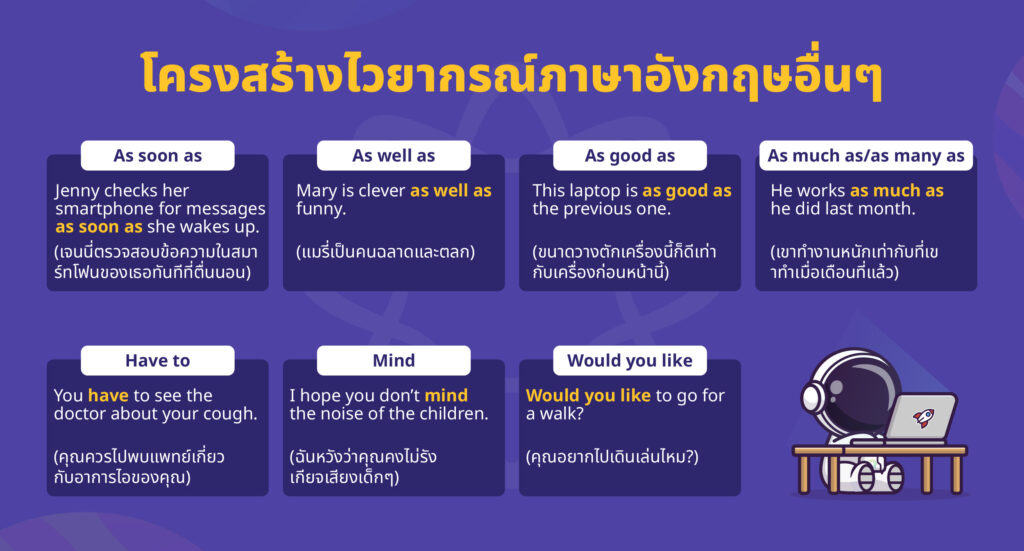
เคล็ดลับการ เรียนรู้ ไวยากรณ์ภาษาอังกฤษ อย่างมีประสิทธิภาพ
กำหนดระดับของตัวเองและเส้นทางที่ชัดเจนในการเรียนรู้ไวยากรณ์ภาษาอังกฤษ
การกำหนดระดับของตนเองเป็นปัจจัยสำคัญที่จะช่วยให้คุณเรียนรู้ไวยากรณ์ภาษาอังกฤษได้อย่างมีประสิทธิภาพ เพื่อพิจารณาปัจจัยนี้ คุณสามารถทำการทดสอบออนไลน์ฟรีบน Google ได้ เมื่อคุณกำหนดระดับของคุณแล้ว ให้สร้างแผนการเรียนรู้ที่ประกอบด้วยเนื้อหาที่ต้องเรียนรู้ เวลาเรียน เป้าหมายการเรียนรู้ และกิจกรรมเฉพาะตามวัน สัปดาห์ และเดือน
เลือกวิธีการเรียนรู้ที่น่าสนใจที่ใกล้เคียงกับความเป็นจริง
หากคุณเรียนไปตลอดแต่ยังจำไม่ได้หรือไม่สามารถนำไปใช้กับการใช้ภาษาอังกฤษทั่วไปในชีวิตประจำวันได้ มีความเป็นไปได้สูงที่คุณมุ่งแต่จะเรียนแค่ทฤษฎีเท่านั้น
ฝึกฝนไวยากรณ์ภาษาอังกฤษเป็นประจำ
การทบทวนไวยากรณ์ภาษาอังกฤษเป็นประจำทุกวันจะช่วยให้คุณจำบทเรียนเก่าได้นานขึ้น และสร้างรากฐานให้คุณซึมซับบทเรียนใหม่ได้อย่างมีประสิทธิภาพมากขึ้น เพราะความรู้มักจะเกี่ยวข้องกัน เพื่อหลีกเลี่ยงความเบื่อหน่ายและทำให้การทบทวนน่าสนใจยิ่งขึ้น คุณสามารถรวมกิจกรรมต่อไปนี้เข้ากับช่วงการทบทวนของคุณได้:
- ฟังเพลงภาษาอังกฤษ
- ดูหนังเป็นภาษาอังกฤษ
- ฝึกเขียน
- อ่านหนังสือภาษาอังกฤษ
- เข้าร่วมชมรมภาษาอังกฤษ
บทความข้างต้นได้รวบรวม ไวยากรณ์ภาษาอังกฤษ ตั้งแต่ A ถึง Z และ หลักการใช้ไวยากรณ์ ภาษาอังกฤษ เพื่อช่วยให้คุณเรียนรู้แต่ละหัวข้อได้อย่างง่ายดาย อย่าลืมติดตามบทความเกี่ยวกับไวยากรณ์ของ ELSA Speak ได้ในครั้งถัดไปกันด้วยนะ!
ลอยกระทงเป็นเทศกาลอันสําคัญของปีที่มีกิจกรรมต่าง ๆ มากมาย มาดูคําศัพท์ แคปชั่น และความรู้เกี่ยวกับ วันลอยกระทง ภาษาอังกฤษ เพื่อใช้ในเทศกาลนี้กับ ELSA Speak กันนะ
ประเพณีลอยกระทงภาษาอังกฤษ
วันลอยกระทงในภาษาอังกฤษเรียกว่า Loy Krathong Festival หรือ Loy Krathong Day วันลอยกระทงตรงกับวันที่ 15 คํ่า เดือน 12 ซึ่งเป็นคืนพระจันทร์เต็มดวงในช่วงฤดูฝน และวันที่ระดับน้ำขึ้นสูงสุด เนื่องจาก “ปรากฏการณ์น้ำขึ้นสูง” วันลอยกระทงปีนี้จะจัดขึ้นในวันที่ 15 พฤศจิกายน 2568
เทศกาลลอยกระทงเป็นประเพณีที่มีต้นกำเนิดมายาวนาน ซึ่งไม่เพียงแต่จัดขึ้นในประเทศไทยเท่านั้น แต่ยังรวมถึงในประเทศต่าง ๆ เช่น อินเดีย กัมพูชา ลาว และเมียนมาร์ ซึ่งมีเทศกาลลอยกระทงที่คล้ายกันแต่มีความแตกต่างบางประการ
ประวัติวันลอยกระทงภาษาอังกฤษ

- ประวัติวันลอยกระทงในภาษาอังกฤษ
| Loy Krathong is celebrated annually on the full-moon day of the twelfth lunar month. Many theories suggest that Loy Krathong is held to honor the footprint of the Buddha Nammathanthi when he gave a sermon and left his footprint on the sands of the Nammahandi River, as well as to show gratitude to the Goddess of Water Phra Mae Khongkha. Some evidence indicates that Loy Krathong was celebrated during the Sukhothai period, under the reign of King Ramkhamhaeng. A stone inscription mentions Loy Krathong and the festival’s founder, concubine Nang Noppamas, who made the first Krathong to offer to the king as a sign of respect. Loy Krathong is a beautiful cultural tradition passed down by the Thai people from ancient times to the present, with various activities that attract many foreign tourists. |
- ภาษาไทย
| ลอยกระทงจัดขึ้นในวันเพ็ญเดือน 12 ของทุกปี หลายทฤษฎีกล่าวว่าการลอยกระทงจัดขึ้นเพื่อสักการะรอยพระพุทธบาทของพระพุทธนัมมทานที เมื่อพระพุทธเจ้าเสด็จไปแสดงธรรมและทิ้งรอยพระพุทธบาทไว้บนผืนทรายแห่งแม่น้ำนัมมานดี พร้อมทั้งแสดงความกตัญญูต่อพระแม่คงคา หลักฐานบางประการบ่งชี้ว่าการลอยกระทงได้จัดขึ้นครั้งแรกในสมัยสุโขทัยในรัชสมัยพ่อขุนรามคำแหง มีศิลาจารึกที่เกี่ยวข้องกับการลอยกระทงและผู้ก่อตั้งเทศกาลลอยกระทง นางนพมาศ ซึ่งเป็นคนแรกที่ทํากระทงเพื่อถวายแด่พระมหากษัตริย์เพื่อแสดงความเคารพ ลอยกระทงเป็นประเพณีทางวัฒนธรรมอันดีงามที่สืบทอดกันมาโดยคนไทยตั้งแต่สมัยโบราณจนถึงปัจจุบัน โดยมีกิจกรรมต่าง ๆ มากมายที่ดึงดูดนักท่องเที่ยวชาวต่างชาติจำนวนมาก |
คําศัพท์เกี่ยวกับวันลอยกระทง ภาษาอังกฤษ
ในช่วงเทศกาลลอยกระทงจะมีกิจกรรมที่น่าตื่นเต้นมากมาย มาเรียนรู้คำศัพท์เกี่ยวกับ เทศกาลลอยกระทง ภาษาอังกฤษ กันด้านล่างนะ
คําศัพท์เกี่ยวกับกิจกรรมวันลอยกระทงในภาษาอังกฤษ

| กิจกรรมวันลอยกระทง ภาษาอังกฤษ | ความหมาย |
| Full moon | พระจันทร์เต็มดวง |
| Lunar month | เดือนทางจันทรคติ |
| The middle of the lunar month | วันเพ็ญ |
| Full-moon day of the twelfth lunar month | วันขึ้น 15 ค่ำเดือน 12 / วันเพ็ญเดือน 12 |
| Rainy season | ช่วงฤดูฝน |
| water’s high in the river | น้ำนองเต็มตลิ่ง |
| Activity | กิจกรรม |
| Culture | วัฒนธรรม |
| Tradition | ประเพณี |
| Belief | ความเชื่อ |
| Rite | พิธีกรรม |
| Prepare | เตรียม |
| Pray | อธิษฐาน |
| ApologizeAsk for forgiveness | ขอขมา |
| River | แม่น้ำ |
| Goddess of Water | พระแม่คงคา |
| Dirty | สกปรก |
| Contest | ประกวด |
| The Nopphamat Queen Contest A Beauty Queen Contest | การประกวดนางนพมาศ |
| Parade | ขบวนพาเหรด |
| Float | ลอย |
| Buddha’s footprint | รอยพระพุทธบาท |
| Misfortunes | โชคร้าย |
| Perform Thai folk dance | รำวง |
| Legend | ตำนาน |
| Fireworks display | การจุดพลุ |
| Loy Krathong online | ลอยกระทงออนไลน์ |
คำศัพท์เกี่ยวกับการลอยกระทงในภาษาอังกฤษ
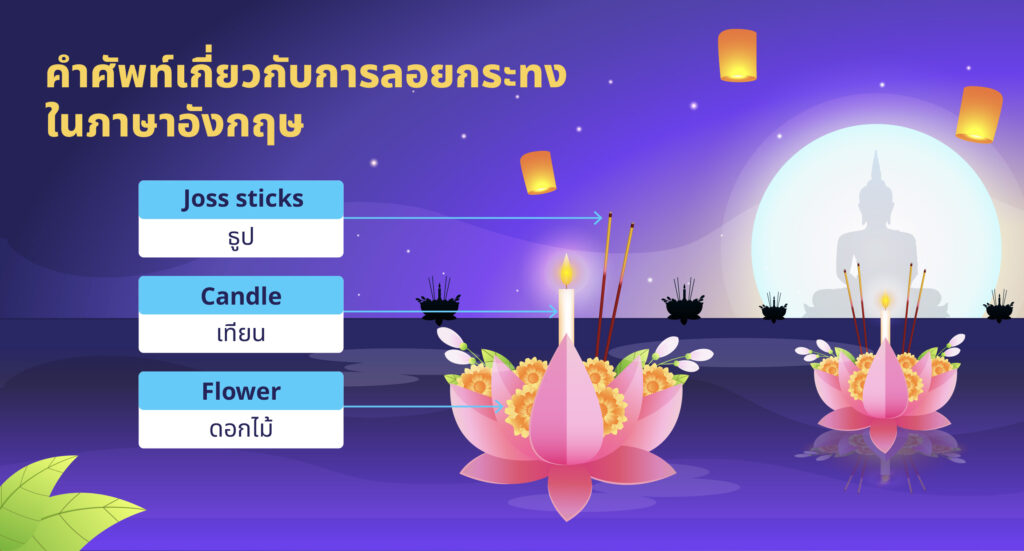
| คำศัพท์ลอยกระทง ภาษาอังกฤษ | ความหมาย |
| Floating basket | กระทง |
| Flower | ดอกไม้ |
| Cape Jasmine Cape Gardenia | ดอกพุด |
| Catharanthus roseus | ดอกแพงพวย |
| Marigold | ดอกดาวเรือง |
| Common cockscombCrested celosin | ดอกหงอนไก่ |
| crown flower | ดอกรัก |
| lotus | ดอกบัว |
| orchid | ดอกกล้วยไม้ |
| Banana leaf | ใบตอง |
| joss sticks | ธูป |
| Candle | เทียน |
| light a candle | จุดเทียน |
| Fire | ไฟ |
| Coin | เหรียญ |
| Scissors | กรรไกร |
| Knife | มีด |
| Pin | เข็มหมุด |
| Toothpick | ไม้จิ้มฟัน |
| Fold | พับ |
| Cut | ตัด |
| Nail | ตะปู |
| Material | วัตถุดิบ |
| Bread | ขนมปัง |
| Plastic | พลาสติก |
| Color | สี |
| Decoration | การตกแต่ง |
| Natural | เป็นธรรมชาติโดยธรรมชาติตามธรรมชาติ |
| Decompose | ย่อยสลาย |
| Pollution | มลพิษ |
| Environmental protection | ดูแลรักษาสิ่งแวดล้อม |
>>> Read more: รวมคำศัพท์ดอกไม้ในภาษาอังกฤษกว่า 100 คำที่ใช้บ่อยที่สุดและเป็นที่นิยม
แคปชั่นเกี่ยวกับวันลอยกระทง ปี 2568 ในภาษาอังกฤษ

| แคปชั่นลอยกระทงภาษาอังกฤษ | ควาหมาย |
| Happy Loy Krathong 2025! | สุขสันต์วันลอยกระทง 2568 |
| Wishing you lots of joy this Loy Krathong! | ขอให้มีความสุขมากๆ ในวันลอยกระทงปีนี้นะ |
| May your wishes come true this Loy Krathong. | ขอให้ความปรารถนาของคุณเป็นจริงในวันลอยกระทงนี้ |
| This Loy Krathong, I hope that Mae Kongka will help you dispel all the troubles in your life. | ขอให้พระแม่คงคาช่วยคุณขจัดปัญหาทั้งหมดในชีวิตของคุณในวันลอยกระทงปีนี้ |
| Happy Loy Krathong! May this Loy Krathong bring only good things into your life, good health, and may you be a strong pillar and lasting happiness! | สุขสันต์วันลอยกระทง ขอให้วันลอยกระทงนำพาแต่สิ่งดี ๆ เข้ามาในชีวิตของคุณ ขอให้คุณมีสุขภาพแข็งแรง และเป็นเสาหลักที่มั่นคงและมีความสุขที่ยั่งยืน |
| Happy Loy Krathong! May your life be smooth and bright like the candlelight in the Krathong. | สุขสันต์วันลอยกระทง ขอให้ชีวิตราบรื่น สดใส ดั่งแสงเทียนในกระทง |
| Happy Loy Krathong! Let all suffering, sorrow, illness, and danger float away. Wishing you find success and good fortune from now on. | สุขสันต์วันลอยกระทง ขอให้ทุกข์โศก โรคภัย ภัยอันตรายทั้งหลายผ่านไป ขอให้ประสบแต่ความสำเร็จและโชคดีตั้งแต่วันนี้จนถึงตลอดไป |
| This Loy Krathong, may Goddess of Water help sweep away the obstacles I am facing, and may my life flow smoothly like the Krathong drifting along the river. | วันลอยกระทงปีนี้ ขอให้พระแม่คงคาช่วยปัดเป่าอุปสรรคต่าง ๆ ที่ข้าพเจ้ากำลังพบเจอ ขอให้ชีวิตมีแต่ความราบรื่นดุจกระทงที่ไหลไปตามสายน้ำด้วยเถิด |
| Happy Loy Krathong Day! May your pockets be heavy and your heart be light. | สุขสันต์วันลอยกระทง ขอให้กระเป๋าของคุณเต็มไปด้วยเงินทองและหัวใจของคุณไร้เรื่องทุกข์ใจ |
| Happy Loy Krathong Day. Sending love and light from afar. | สุขสันต์วันลอยกระทง ขอส่งความรักและความหวังดีไปให้คุณจากไกล ๆ นะ |
>>> Read more: วันสงกรานต์ภาษาอังกฤษ: คําศัพท์ คําอวยพร และเรียงความในปีใหม่ 2568

ย่อหน้าสรุปเรื่องราวเกี่ยวกับเทศกาลลอยกระทงในภาษาอังกฤษ
คำที่เป็นตัวหนาในย่อหน้าคือคำศัพท์ที่ได้เรียนข้างต้นแล้ว เรามาอ่านย่อหน้า สรุป เทศกาล ลอยกระทง ภาษาอังกฤษ และทบทวนคำศัพท์กันเลย
The Loy Krathong festival takes place on the full-moon day of the twelfth lunar month, usually in November. The purpose is to pay respect to the Goddess of Water and get rid of bad luck. On this day, people often float krathongs made from banana leaves, decorated with flowers and candles. Floating krathongs symbolizes letting go of negative things and bad luck, and asking for forgiveness for polluting the water. The festival is highlighted by the sparkling scene of thousands of krathongs floating on the river, along with activities such as traditional parades, and cultural performances.
เทศกาลลอยกระทงจัดขึ้นในวันเพ็ญเดือน 12 ตามจันทรคติ ซึ่งโดยปกติจะจัดขึ้นในเดือนพฤศจิกายนของปฏิทินสุริยคติ โดยมีวัตถุประสงค์เพื่อบูชาพระแม่คงคาและปัดเป่าความโชคร้าย ในเทศกาลนี้ ผู้คนมักจะลอยกระทงที่ทำจากใบตองประดับด้วยดอกไม้และเทียน การลอยกระทงหมายถึงการปล่อยสิ่งไม่ดีและความโชคร้ายลงน้ำและขอขมา ซึ่งสามารถสร้างมลพิษให้กับแหล่งน้ำได้เทศกาลนี้โดดเด่นด้วยฉากระยิบระยับของกระทงนับพันที่ลอยอยู่บนแม่น้ำ พร้อมด้วยกิจกรรมต่าง ๆ เช่น ขบวนพาเหรดแบบดั้งเดิมและการแสดงนาฏศิลป์ทางวัฒนธรรม
คําถามที่พบบ่อยเกี่ยวกับ เทศกาลลอยกระทง ภาษาอังกฤษ
Loy Krathong Day แปลว่า อะไร?
Loy Krathong Day แปลว่า วันลอยกระทง
นางนพมาศ ภาษาอังกฤษ
นางนพมาศ ภาษาอังกฤษ คือ Nang Nopphamat

ELSA Premium Lifetime
9,999 บาท ->6,439 บาท

ELSA Pro Lifetime
3,659 บาท ->2,799 บาท

ELSA Premium 1 year
8,497 บาท ->2,885 บาท

ELSA Pro 1 year
2,499 บาท ->1,528 บาท
เนื้อเพลงลอยกระทงอังกฤษ
- เนื้อเพลงลอยกระทงอังกฤษ
November full moon shine loy kratong loy kratong
And the water’s high in local river and the klong
loy loy kratong loy loy kratong
loy kratong is here and everybody’s full of cheers
We’re together at the Klong each on with each krathong
as we push away we pray we would see a better day
- ความหมาย เนื้อเพลงลอยกระทงอังกฤษ
วันเพ็ญเดือนสิบสอง น้ำนองเต็มตลิ่ง
เราทั้งหลายชายหญิง
สนุกกันจริง วันลอยกระทง
ลอย ลอยกระทง ลอย ลอยกระทง
ลอยกระทงกันแล้ว
ขอเชิญน้องแก้วออกมารำวง
รำวงวันลอยกระทง รำวงวันลอยกระทง
บุญจะส่งให้เราสุขใจ บุญจะส่งให้เราสุขใจ
วันเพ็ญเดือนสิบสอง น้ำนองเต็มตลิ่ง
เราทั้งหลายชายหญิง
สนุกกันจริง วันลอยกระทง
ลอย ลอยกระทง ลอย ลอยกระทง
ลอยกระทงกันแล้ว
ขอเชิญน้องแก้วออกมารำวง
รำวงวันลอยกระทง รำวงวันลอยกระทง
บุญจะส่งให้เราสุขใจ บุญจะส่งให้เราสุขใจ
พระแม่คงคา ภาษาอังกฤษ
พระแม่คงคา ภาษาอังกฤษ คือ Goddess of Water
หวังว่าหัวข้อ วันลอยกระทง ภาษาอังกฤษ ในบทความข้างต้นจะช่วยให้คุณเพิ่มคำศัพท์ภาษาอังกฤษ คำอธิษฐาน และข้อมูลที่เกี่ยวข้อง เพื่อเตรียมพร้อมสำหรับวันลอยกระทงอันแสนสุข อย่าลืมติดตามบทความถัดไปของ ELSA Speak กันอีกนะ
Instead of เป็นวลีที่พบบ่อยในภาษาอังกฤษ แต่ไม่ใช่ใครก็สามารถเข้าใจวิธีการใช้และหลักไวยากรณ์ของมัน ELSA Speak จะพาคุณมาสำรวจความหมายและโครงสร้างต่าง ๆ ของ Instead of เพื่อให้คุณสามารถนำไปใช้ได้อย่างถูกต้อง ในตอนท้ายของบทความยังมีแบบฝึกหัดพร้อมเฉลยเพื่อให้คุณสามารถฝึกฝนและทำความเข้าใจเนื้อหานี้ได้อย่างครบถ้วน
คำจำกัดความของ Instead of คืออะไร?
ตามพจนานุกรมเคมบริดจ์ instead of แปลว่า (preposition) – in place of someone or something หรือหมายถึงการใช้แทนใครบางคนหรือบางสิ่ง ซึ่งทำหน้าที่เป็นคำบุพบทเชื่อมโยงสองส่วนในประโยค ใช้เพื่อพูดถึงการแทนที่ระหว่างคนหรือสิ่งต่าง ๆ
Instead of อ่านว่า /ɪnˈsted ˌəv/
ผู้เรียนสามารถใช้ instead ได้ทั้งต้นหรือท้ายประโยค แต่ในชีวิตประจำวัน คำนี้มักนิยมใช้คำนี้ที่ท้ายประโยคโดยไม่ต้องตามด้วย of
Instead of ตัวอย่างประโยค:

- Instead of complaining, why don’t we try to change things?
(แทนที่จะบ่น ทำไมเราไม่ลองเปลี่ยนแปลงอะไรบางอย่างล่ะ?)
- I will buy a gaming laptop instead of a MacBook because I can play games on it.
(ฉันจะซื้อแล็ปท็อปสำหรับเล่นเกมแทนที่จะซื้อ MacBook เพราะฉันสามารถใช้เล่นเกมได้)
โครงสร้างและวิธีการใช้ Instead of + สิ่งอะไรบางอย่าง
Instead of เป็นคำบุพบทในภาษาอังกฤษที่ใช้ตามด้วยคำประเภทต่างๆ ในโครงสร้างที่สามารถรับรู้ได้ง่าย โดยเฉพาะโครงสร้างและการใช้งานแต่ละประเภทมีดังนี้:
| Instead of ตามด้วย | โครงสร้าง | Instead of การใช้ | ตัวอย่าง |
| คำนาม | Instead of + Noun | ใช้เพื่อแสดงถึงการแทนที่สิ่งของหรือทางเลือกอื่นๆ | I didn’t have enough money, so I chose that motorbike instead of a more expensive one. (ฉันมีเงินไม่พอ ดังนั้นฉันเลือกมอเตอร์ไซค์คันนี้แทนที่จะซื้อคันที่แพงกว่า) Yesterday, I learned English instead of Maths. (เมื่อวานนี้ฉันเรียนภาษาอังกฤษแทนที่จะเรียนคณิตศาสตร์) |
| ชื่อเฉพาะ | Instead of + Name | ใช้เพื่อบ่งบอกถึงการแทนที่บุคคลหรือสถานที่ด้วยบุคคลหรือสถานที่อื่น | He chose to work with Tom instead of Jack on the project. (เขาเลือกทำโครงการกับทอมแทนที่จะเป็นแจ็ค) Instead of Phuket, we are going to travel to Chiang Mai. (แทนที่จะไปภูเก็ต เราวางแผนจะไปเที่ยวเชียงใหม่) |
| บุรุษสรรพนาม | Instead of + Pronoun | ใช้เพื่อแสดงถึงการแทนที่บุคคลหรือสิ่งใดสิ่งหนึ่ง มักเป็นบุรุษสรรพนามทำหน้าที่เป็นกรรม เช่น you, us, them, him, her, it และ me | Instead of you, I will ask him for help. (แทนที่จะขอความช่วยเหลือจากคุณ ฉันจะขอความช่วยเหลือจากเขา) She decided to call me instead of him. (เธอตัดสินใจโทรหาฉันแทนที่จะโทรหาเขา) |
| กริยารูป -ing | Instead of + V-ing | ใช้เมื่อกล่าวถึงการแทนที่การกระทำหนึ่งด้วยการกระทำอื่น | Instead of studying late at night, I prefer to study in the morning. (แทนที่จะอ่านหนังสือดึก ฉันชอบเรียนตอนเช้ามากกว่า) She decided to go for a walk instead of watching TV. (เธอตัดสินใจไปเดินเล่นแทนที่จะดูทีวี) |
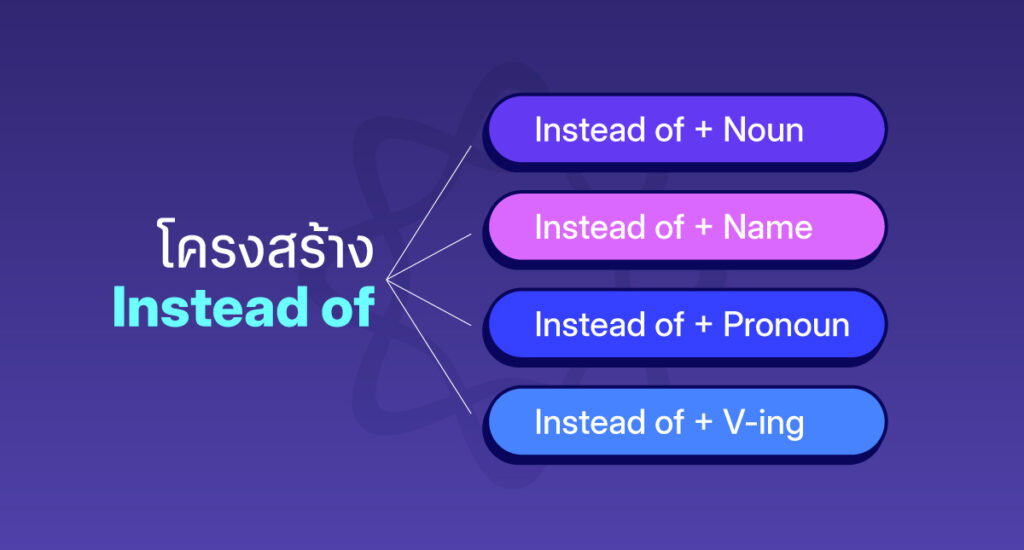
| อยากพูดภาษาอังกฤษให้เป็นธรรมชาติมากขึ้นไหม? เริ่มต้นจาก a an the กันเลย! |
การแยกความแตกต่างระหว่าง Instead/instead of/rather than
โครงสร้าง Instead of เป็นโครงสร้างที่นิยมอย่างมากในภาษาอังกฤษ แต่ก็อาจทำให้ผู้เรียนสับสนกับวลีอื่น ๆ เช่น Rather than หรือ Instead ความแตกต่างเฉพาะของแต่ละวลีมีดังนี้ :
การเปรียบเทียบ Instead of กับ Rather than
ทั้งโครงสร้าง Instead of และ Rather than ใช้เพื่อแสดงถึงการเลือก 1 ใน 2 การกระทำ แต่มีความแตกต่างกันในด้านการใช้งานและความหมาย
| Instead of | Rather than |
| มักใช้เพื่อแสดงถึงการแทนที่โดยตรงระหว่างการกระทำหรือสิ่งของอย่างหนึ่งกับอีกอย่างหนึ่งมักตามด้วยคำนามหรือคำกริยาเติม -ing ตัวอย่าง: I will watch a movie instead of reading a book. (แทนที่ฉันจะอ่านหนังสือแต่ฉันเลือกดูหนัง) | มักใช้เพื่อเน้นความชอบหรือการเลือก 1 ใน 2 การกระทำมักอยู่ระหว่างสองการกระทำ พร้อมกับคำกริยาในรูป infinitive หรือคำกริยาเติม -ing ตัวอย่าง: I would rather watch a movie than read a book. (ฉันชอบดูหนังมากกว่าอ่านหนังสือ) |
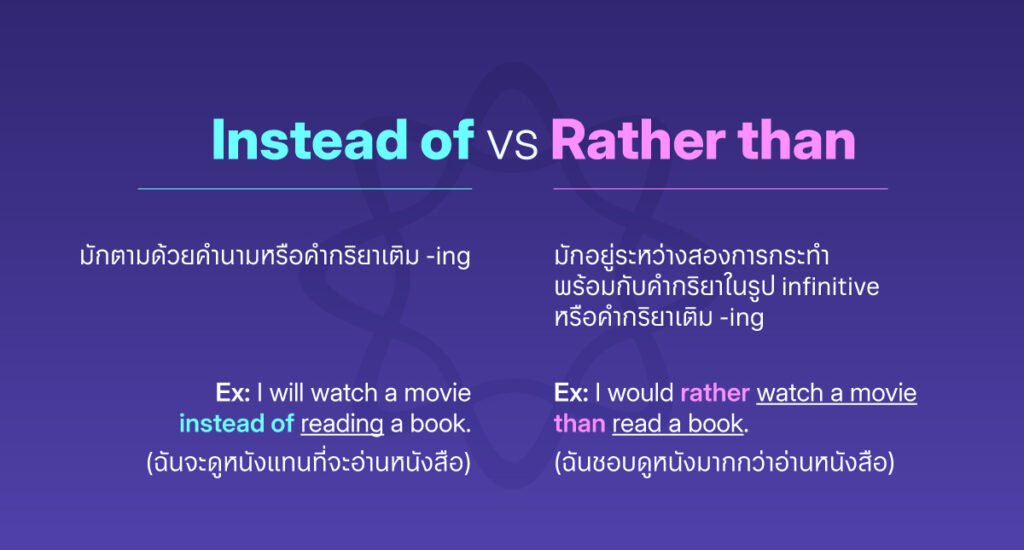
| Rather than เป็นชนิดหนึ่งของ conjunction ในภาษาอังกฤษ ส่วน “instead” และ “instead of” เป็น conjunction หรือไม่ มาศึกษาบทความเกี่ยวกับ conjunction กันเถอะ |
Instead กับ instead of
ทั้งโครงสร้าง Instead of และ Instead เกี่ยวข้องกับการแทนที่ แต่มีการใช้งานแตกต่างกันในประโยค:
| Instead of | Instead |
| มักใช้เพื่อแสดงถึงการแทนที่โดยตรงระหว่างการกระทำหรือสิ่งของอย่างหนึ่งกับอีกอย่างหนึ่งมักตามด้วยคำนามหรือคำกริยาเติม -ing ตัวอย่าง: I will watch a movie instead of reading a book. (แทนที่ฉันจะอ่านหนังสือแต่ฉันเลือกดูหนัง) | มักใช้ในตอนท้ายประโยค เพื่อแทนความคิดหรือการกระทำที่ได้กล่าวไปก่อนหน้านั้นแต่ไม่ได้ระบุในประโยคมักจะปรากฏอยู่ท้ายประโยค และใช้เพื่อแทนที่การกระทำที่กล่าวไว้ก่อนหน้านี้ ตัวอย่าง: I will watch a movie instead. (ฉันจะดูหนังดีกว่า) |
โดยสรุปว่า Instead of เน้นการแทนที่อย่างเจาะจงระหว่างสองตัวเลือก ขณะที่ Instead มักใช้เพื่อแสดงการแทนที่แบบทั่วไปมากกว่า และมักจะวางอยู่ท้ายประโยค ความแตกต่างนี้ช่วยให้ผู้พูดสามารถเลือกใช้คำที่เหมาะสมกับบริบทได้

คำพ้องความหมายของ Instead กับ Instead of
ด้านล่างนี้เป็นคำพ้องความหมายของ Instead กับ Instead of ที่คุณควรรู้เพื่อเสริมคลังคำศัพท์ภาษาอังกฤษในการสื่อสารของคุณ
Synonym of instead of
| คำพ้องความหมายของ Instead of | การสะกดคำ | การใช้งาน |
| 1. In place of | /in ˌpleɪs ˌəv/ | วลีนี้ใช้เพื่อแสดงถึงการแทนที่บุคคล สิ่งของ หรือสถานที่หนึ่งด้วยอีกสิ่งหนึ่ง ตัวอย่าง: I chose to have a salad in place of fries. (ฉันเลือกกินสลัดแทนมันฝรั่งทอด) |
| 2. In lieu of | /in ˌljuːˌəv/ | มักใช้เพื่อแสดงการแทนที่การกระทำ การชำระเงิน หรือการเลือกสิ่งอื่น ตัวอย่าง: They offered a discount in lieu of a refund. (พวกเขาเสนอส่วนลดแทนการคืนเงิน) |
| 3. As an alternative for | /æz ˌæn ˌɒlˈtɜː.nə.tɪv ˌfɔːr/ | ใช้เพื่อแสดงว่าสิ่งหนึ่งสามารถใช้แทนหรือเปลี่ยนเป็นอีกสิ่งหนึ่งได้ ตัวอย่าง: Many people use white wine as an alternative for red wine in braised dishes. (หลายคนใช้ไวน์ขาวแทนไวน์แดงในอาหารตุ๋น) |

คำพ้องความหมายของ Instead
| คำพ้องความหมายของ Instead | การสะกดคำ | การใช้งาน |
| 1. Alternatively | /ɔːlˈtɜːrnətɪvli/ | ใช้เพื่อแสดงทางเลือกหรือแนวทางอื่น มักใช้เพื่อเสนอทางเลือกอื่น ตัวอย่าง: You can purchase this product or alternatively buy the other one. (คุณสามารถซื้อสินค้านี้หรือซื้อสินค้าอื่นก็ได้) |
| 2. As a replacement | /æz ə rɪˈpleɪsmənt/ | ใช้เพื่อแสดงว่าสิ่งของ ผลิตภัณฑ์ หรือวิธีการใดถูกนำมาใช้แทนสิ่งอื่น ตัวอย่าง: If you can’t find material A, use material B as a replacement. (ถ้าคุณหาอุปกรณ์ A ไม่เจอ ให้ใช้อุปกรณ์ B แทนก็ได้) |
| 3. In its place | /ɪn ɪts pleɪs/ | ใช้เพื่อบ่งบอกว่าสิ่งใดสิ่งหนึ่งถูกใช้แทนที่ของอีกอย่าง ตัวอย่าง: After they removed the old ones, they installed the new ones in its place. (หลังจากพวกเขาถอดอันเก่าออก พวกเขาก็ติดตั้งอันใหม่แทน) |
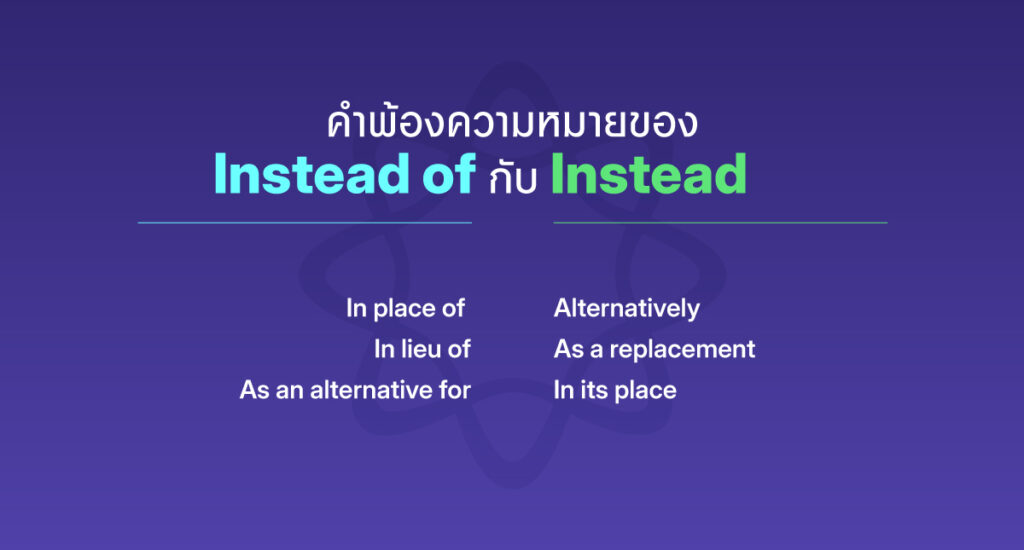
นอกจากนี้ คุณสามารถใช้วลีที่มีความหมายใกล้เคียงกับ Instead และ Instead of ในภาษาอังกฤษ และใช้ในบริบทที่เหมาะสมเพื่อหลีกเลี่ยงการใช้คำซ้ำในการเขียนหรือการนำเสนอ ทำให้การสื่อสารน่าสนใจยิ่งขึ้น
แบบฝึกหัดการใช้ Instead of
แบบฝึกหัดที่ 1: เลือกคำตอบที่ถูกต้องในประโยคต่อไปนี้:
1. I will have a salad _______ ordering a burger.
A. instead
B. instead of
C. rather than
2. He likes playing soccer _______ watching it on TV.
A. instead
B. instead of
C. rather than
3. _______ going to the gym, she decided to run outside.
A. Instead
B. Instead of
C. Rather than
4. You should focus on studying _______ wasting time on social media.
A. instead
B. instead of
C. rather than
5. We can take the train _______ driving all the way.
A. instead
B. instead of
C. rather than
แบบฝึกหัดที่ 2: แปลประโยคต่อไปนี้เป็นภาษาอังกฤษโดยใช้ Instead of:
- แทนที่จะไปเรียน ฉันกลับไปเที่ยว
- แทนที่จะอ่านหนังสือ เธอกลับไปดูหนัง
- แทนที่จะทำอาหาร เขากลับไปกินข้าวข้างนอก
- แทนที่จะเดินเล่น พวกเขากลับไปช้อปปิ้ง
- แทนที่จะพูดคุย พวกเขากลับนั่งเงียบ ๆ รับฟัง
แบบฝึกหัดที่ 3: เติมคำที่เหมาะสมในช่องว่างด้วยโครงสร้าง Instead of:
1. Instead of ___ (go/went/going) to the party, she decided to stay home and read a book.
2. He chose to eat a salad instead of ___ (a/an) burger for lunch today.
3. Instead of ___ (take/took/taking) the elevator, they climbed the stairs to the fifth floor.
4. She spent her weekend volunteering at the animal shelter instead of ___ (go/going/gone) shopping.
5. Instead of ___ (watching/watch/watched) TV, he spent his free time practicing the guitar.
เฉลย
แบบฝึกหัดที่ 1:
| 1. B | 2. B | 3. B | 4. B | 5. B |
แบบฝึกหัดที่ 2:
1. I went playing instead of going to school.
2. She watched a movie instead of studying.
3. He ate out instead of cooking.
4. They went shopping instead of going for a walk.
5. They just listened instead of talking.
แบบฝึกหัดที่ 3:
| 1. going | 2. a | 3. taking | 4. going | 5. watching |
คำถามที่พบบ่อย
Instead of me แปลว่า อะไร?
Instead of me แปลว่า แทนที่จะเป็นฉัน
หวังว่าบทความนี้จาก ELSA Speak จะช่วยให้คุณเข้าใจเกี่ยวกับ Instead of มากขึ้น รวมถึงโครงสร้างและวิธีการใช้งานของ Instead of ในชีวิตประจำวัน จงฝึกฝนบ่อย ๆ ไวยากรณ์ภาษาอังกฤษเพื่อพัฒนาทักษะภาษาของตัวเองและสร้างบทสนทนาที่น่าสนใจมากขึ้นนะ!
